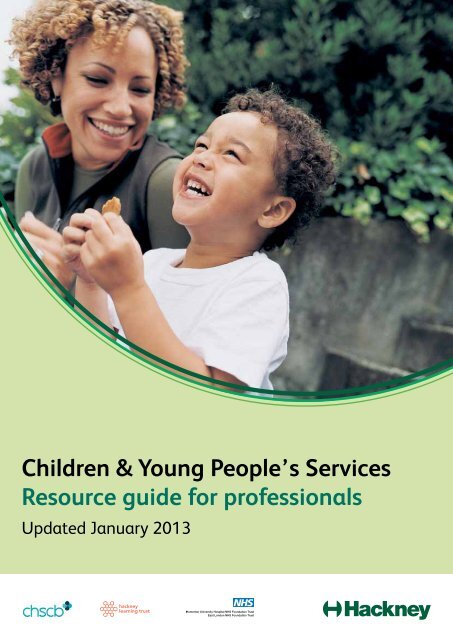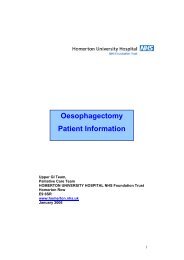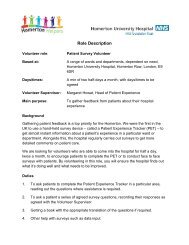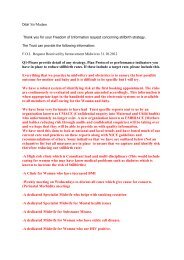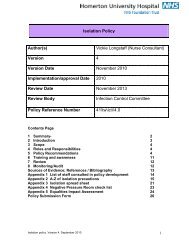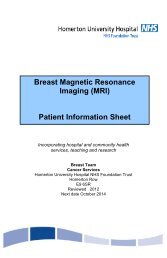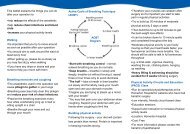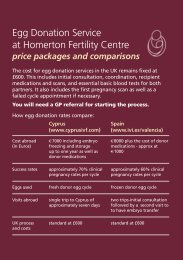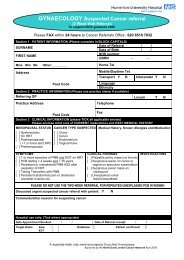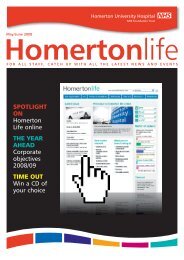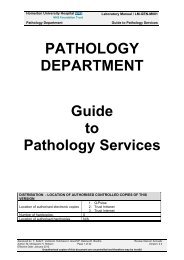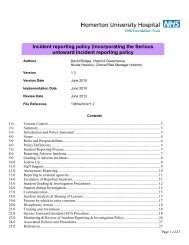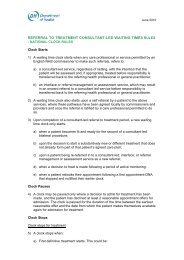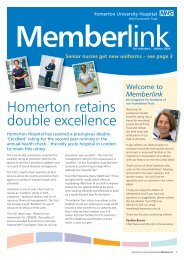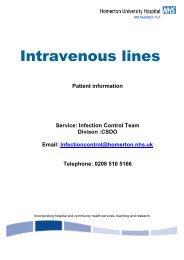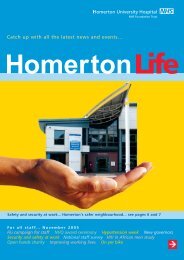Children & Young People's Services Resource guide for professionals
Children & Young People's Services Resource guide for professionals
Children & Young People's Services Resource guide for professionals
You also want an ePaper? Increase the reach of your titles
YUMPU automatically turns print PDFs into web optimized ePapers that Google loves.
2.1 Agreed Definitions <strong>for</strong> Hackney Child Wellbeing FrameworkThe Hackney Child Wellbeing Framework is a development of the Child Wellbeing Model that wasintroduced in 2009. The model has been praised by several Ofsted inspections which noted that itwas well understood and used across agencies within <strong>Children</strong>’s <strong>Services</strong>.The Model was refreshed in 2012 to reflect improvements in partnership working and place moreemphasis upon the role of all services in identifying need and promoting the wellbeing of childrenand families.The Hackney Child Wellbeing Framework focuses upon child and family need; not thresholds <strong>for</strong>services.It does, however, attempt to give an indication of what might be an appropriate approach toresponding to need by defining three levels:• Universal - a response by universal services, often working individually• Universal and Universal Partnership Plus - a response by universal services working togetherin universal settings and sometimes bringing additional targeted resources into a multi agencypartnership plan• Complex/high risk – a response that requires high level Specialist <strong>Services</strong>, often governed bystatutory frameworks, to take the lead role.Universal services that meet universal need include schools, <strong>Children</strong>’s Centres, health visiting,school nursing, GPs, play services, <strong>Young</strong> Hackney, police, housing and the voluntary and communitysector.Some of the targeted services that can support universal services include family support services,First Steps, <strong>Young</strong> Hackney, SEN, behaviour and educational support, speech and language therapy,short breaks and Transition, and voluntary and community services.When needs are sufficiently intense or numerous to require a Universal Plus or Universal PartnershipPlus response, this will often require a written plan as part of the Common Support Framework, KeyWorker Action Plan (step across) or an Initial Assessment (step down) so that the family and allworkers involved are aware what outcomes we hope to achieve, who is responsible <strong>for</strong> the actions toachieve them and how we will know when we are successful.When children and families have complex needs or are high risk, specialist support will sometimesbe provided by <strong>Children</strong>’s Social Care. This is indicated in the table by using a bold typeface. Theseare often situations where the child is at risk because of deficits in parenting or carer capacity. Otherspecialist services include <strong>Young</strong> Hackney, Child and Adolescent Mental Health teams and specialistDisability <strong>Services</strong> (social care and/or health). Thre is also a complex care nursing team.The pathway and processes <strong>for</strong> responding to need are described in the <strong>Resource</strong> Guide.It is important to remember that each child and family will have a unique setof needs and strengths. The Child Wellbeing Framework is a <strong>guide</strong> and is notintended to replace professional knowledge, experience and discretion.<strong>Resource</strong> Guide <strong>for</strong> <strong>professionals</strong> | Updated January 2013 5
Hackney Child Wellbeing FrameworkUniversalAny identified additionalneeds can be met byuniversal services.Universal and UniversalPartnership PlusChild/young person’s needs can be metby universal services working togetheror with the addition of some targetedservicesHealth • Has had all ageappropriateinterventions inthe Healthy ChildProgramme• Is healthy and well,development is ageappropriate and hashad all appropriateimmunisations• Has a healthy diet andappears well nourished• Is registered with a GPand basic services suchas dentist, optician• Can manage owntreatment <strong>for</strong> anycondition e.g. asthma,and take part ineveryday life• Long-term conditions or serious illness• Frequent illness/accidents• Mild level of disabilityrequiring additional support to bemaintained in a universal setting• Developmental delay• Non-immunised• Significantly under/ overweight• Significant fFaltering growth of knowncause• Multiple A & E attendances• Language and communicationdifficulties• Missed appointments – routine andnon-routineComplex/High RiskChild/young person’s needs require specialistservices or a statutory response including <strong>Children</strong>’sSocial Care investigation and/or intervention (inbold)• Significant faltering growth of unknown cause• Significant developmental delay, disabilityor long-term condition where concerns aboutparenting capacity exists• Injuries not consistent with explanation given• Disclosure of abuse from child/young person• Serious concern regarding fabricated/induced illness• Evidence of physical, emotional or sexualharm or neglect• Complex disability that cannot be maintainedin a mainstream setting or without additionalsupport6<strong>Resource</strong> Guide <strong>for</strong> <strong>professionals</strong> | | Updated January 2013
Education • Achieving key stages• Good attendance atschool/college/training• No barriers to learning• Planned progressionbeyond statutory schoolageSocial andNeighbourhood• Development stimulatedthrough play and/orappropriate peer groupinteraction• Knowledgeable aboutthe effects of crime andanti social behaviour• Age appropriateknowledge about sexand relationships• Age appropriateindependent living skills• Poor concentration• Low motivation• Out of school• Excluded/at risk of exclusion• Regular truanting or non attendance• NEET or at risk of NEET• School action plus• Poor access to books, toys oreducational materials• Educated at home with engagementfrom family, but child is notdeveloping appropriately• Illegal employment• Difficulties with peer relationships• Child/young person not exposed tonew/stimulating experiences• Pro offending behaviour and attitudes• Coming to the notice of police• Substance misuse potentiallydamaging to health/development• High levels of anti social behaviour/criminality• Learning disability that places youngperson in vulnerable situations• Chronic non-attendance, truanting• Permanently excluded• <strong>Children</strong> missing from education• No parental support <strong>for</strong> education• Statement of Special Educational Needs• Professional concerns about the safety orwellbeing of a child whose family has electedhome education without agreeing to meetwith Hackney Learning Trust• Inappropriate sexual/ sexualised behaviour• Under 13 engaged in sexual activity• Teenage parent under 16• <strong>Young</strong> people experiencing current harm throughtheir use of substances• <strong>Young</strong> people who pose a risk of harm to others• <strong>Young</strong> people involved in the Criminal JusticeSystem• <strong>Children</strong> in secure remand• Child being sexually exploited• Child exploited <strong>for</strong> criminal purposes• Child in custody with no family support orinvolvement• Child in hospital setting continuously <strong>for</strong> 3months8<strong>Resource</strong> Guide <strong>for</strong> <strong>professionals</strong> | | Updated January 2013
Parents/Parenting • Consistent parentingproviding appropriateguidance andboundaries• Child’s physical needsare adequately provided<strong>for</strong>• Parenting generallydemonstrates praise,emotional warmth andencouragement• Positive familyrelationships, includingbetween separatedparents• Mental or physical health needs thatcan affect the care of the child• Failure to access pre/post natal care• Post natal depression• Excessive anxiety regarding child’shealth• Colludes with or condones failure toattend school• Inconsistent or harsh parenting• Lack of consistent boundaries andguidance• Relationship difficulties that impingeon child• Substance and/or alcohol misuseaffecting parenting• Criminal or anti-social behaviour• Learning difficulties that affectparenting• Disabled young person left alone• <strong>Young</strong> carers• Parent has serious mental health conditionand child/young person subject of parentaldelusion• Very young or vulnerable child left alone• Drug or alcohol abuse seriously affecting theability to function• Child/young person rejected from home• Inability to judge dangerous situations• Unable to protect child from harm• Emotional neglect where earlier interventionshave failed to be effective• Adult mental health significantly impactingon the care of the child or young person• Parent with significant learning disabilityseriously affecting ability to parent• Any carers who attempt suicide or self harm• Parent causing significant harm to childContinued ><strong>Resource</strong> Guide <strong>for</strong> <strong>professionals</strong> | Updated January 2013 9
Family andEnvironment• Good familyrelationships• Family feels accepted bythe community• Family members arephysically well andmentally stable• Family has positiverelationships andappropriate supportfrom others• Income is consistent andsufficient to meet basicfamily needs• Area has good, ageappropriate facilities• Inadequate/overcrowded housing• Socially or physically isolated• Sibling with disability or significanthealth problems• Family experiencing harassment,discrimination or are victims of crime• <strong>Children</strong> sometimes wearinappropriate clothing or appearunkempt• Family homeless or in temporaryaccommodation• Scale 1 & 2 Domestic Violence as perBarnardo’s Guidance• <strong>Children</strong> who are being looked after in privatefostering arrangements• Presence of adult who poses risk to children inhousehold or in contact with family• Drug taking, prostitution, and illegal activitiesthat impact on child• <strong>Children</strong> constantly appear dirty and clothingis inappropriate to season• Imminent family breakdown• Homeless and destitute• Scale 3 & 4 Domestic Violence as perBarnardo’s Guidance (Levels 1 & 2 if childunder 1)• Family requires intensive support because ofharassment/discrimination10<strong>Resource</strong> Guide <strong>for</strong> <strong>professionals</strong> | Updated January 2013
3. Common Support FrameworkIn recognition of the potential <strong>for</strong> a variety of <strong>professionals</strong> to be working with children, youngpeople and their families it is understood that unnecessary barriers and safeguarding delays couldoccur. Consequently, the Common Support Framework (CSF) is Hackney’s response to the need toprovide appropriate, integrated and effective support <strong>for</strong> families in the most efficient way possible.It incorporates elements of, and learning from, the Common Assessment Framework (CAF), butplaces the emphasis upon the delivery plan(s) and outcomes rather than in<strong>for</strong>mation gathering andduplicate assessments.It is designed to bring families closer to the ideal of “No Wrong Door” and to eliminate unnecessarybureaucracy <strong>for</strong> practitioners.It consists of three interlinking elements:FamilyIn<strong>for</strong>mationFormContains relevantdetails about allmembers of thefamily e.g. names,addresses, DOB,schools, ethnicity etc.This will replacemany referral <strong>for</strong>msand be used tosupport ‘servicebrokering’.Assessment ofNeedAny valid holisticassessment of needincluding:• CAF• Initial Assessment• PSP• ASSET• ONSET• <strong>Young</strong> HackneyAssessmentDelivery and Review PlansA <strong>for</strong>m with specific outcomes and reviewtargets. To be used to ensure that multi agencyworking is coordinated.Except in cases of serious risk to the child, all in<strong>for</strong>mation sharing will require parental consent and this will beincorporated into the system.How will this affect out of borough working?Hackney endorsed the Pan London CAF Protocol because it is committed to the principle of workingin partnership to ensure that administrative boundaries do not negatively affect the provision ofappropriate services to children, young people and families.For further in<strong>for</strong>mation contact triage@hackney.gov.uk<strong>Resource</strong> Guide <strong>for</strong> <strong>professionals</strong> | Updated January 2013 11
4. Partnership TriagePartnership Triage was launched in Hackney in July 2009; it is led by <strong>Young</strong> Hackney and acts as asingle point of access <strong>for</strong> agencies to look up data on children. It also operates as an intelligenceteam that provides connectivity to:• Hackney Learning Trust• GPs and Health• Hackney <strong>Children</strong> & <strong>Young</strong> People’s <strong>Services</strong> (CYPS)• Police in<strong>for</strong>mation systems• Homerton HospitalPartnership Triage links <strong>Children</strong>’s Social Care (CSC) First Response Team, <strong>Children</strong>’s Centre Multi-Agency Team (MAT) meetings, <strong>Children</strong> & <strong>Young</strong> People’s Partnership Panel (CYPPP) and <strong>Young</strong>Hackney.The Common Support Framework is intrinsically linked to the Partnership Triage Unit. The Unit isequipped to research in<strong>for</strong>mation on children from 0 – 18 from a range of sources determining whichagencies (if any) are already involved. It can also gather additional relevant in<strong>for</strong>mation and passthis comprehensively to the agency that can provide the most appropriate service response; the unitwill also monitor the actions that arise from those referrals. In<strong>for</strong>mation is held in a database thatallows practitioners to make a more balanced judgment about potential need and risk based uponthe accumulation of evidence.All agencies referring families that may require a coordinated approach to delivery should referdirectly into the Partnership Triage triage@hackney.gov.ukAppropriate referrals <strong>for</strong> families with children 0 – 5 will be passed to the Multi-Agency Team (MAT)meetings held in <strong>Children</strong>’s Centres. Appropriate referrals <strong>for</strong> children and young people aged6 – 19 are passed to the <strong>Children</strong> and <strong>Young</strong> People’s Partnership Panel (CYPPP) both of whichprovide a multi-agency <strong>for</strong>um of <strong>professionals</strong> who will agree a coordinated approach to planninginterventions <strong>for</strong> children, young people and families.The pages that follow provide a brief <strong>guide</strong> to the range of services <strong>for</strong> children, young people andfamilies within Hackney.5. Health <strong>Services</strong>5.1 Acute <strong>Services</strong> at the Homerton Hospital<strong>Children</strong>’s Emergency AssessmentThe <strong>Children</strong>’s Emergency Assessment unit is part of the hospital’s accident and emergencydepartment. Open 24 hours a day children and young people are cared <strong>for</strong> in a dedicated unit by ateam of children’s nurses working with accident and emergency doctors and paediatricians; GPs see,assess, treat and/or arrange admission <strong>for</strong> further treatment as necessary.Telephone: 020 8510 7808/732812<strong>Resource</strong> Guide <strong>for</strong> <strong>professionals</strong> | Updated January 2013
The Starlight UnitStarlight Ward provides inpatient accommodation <strong>for</strong> children or young people up to the age of 16years who need admission <strong>for</strong> further assessment or treatment. <strong>Children</strong> or young people are cared<strong>for</strong> by a team of children’s nurses in a dedicated ward. The service is led by a team of ConsultantPaediatricians who oversee the assessment, treatment and review of children, with the aim ofensuring early discharge home with on-going access to and support from the consultant team orwith input from the <strong>Children</strong>’s Community Nursing Team until the child or young person is ready tobe discharged back to their GP.Telephone: 020 8510 7450/7395(See pages 14 – 16 <strong>for</strong> outpatients in<strong>for</strong>mation)5.2 Community Paediatric <strong>Services</strong>The community paediatric team is made up of six consultants, two associate specialists, twospeciality paediatricians and five paediatricians in training. They have a pivotal role in thesupervision and co-ordination of care <strong>for</strong> the individual child/young person and their family. Theteam works across universal, targeted and specialist services providing services in three principalareas:• child development and disability, including audiology and the assessment of children with specialeducational needs;• child protection and looked after children; and• child public health including immunisation and obesity. There is a named paediatrician <strong>for</strong> each schoolin Hackney and locality clinics <strong>for</strong> children with common developmental problems as well as <strong>for</strong> obesityand enuresis (bed wetting).<strong>Services</strong> are based at Hackney Ark and Hackney Community College but delivered at the HackneyArk and in a range of other community venues including clinics, schools and nurseries. Referrals areaccepted primarily from health <strong>professionals</strong> but are also accepted from social care and education.The service lead is Dr Gabrielle Laing (Consultant Community Paediatrician and Associate MedicalDirector) – contact details as below:Community Health <strong>Services</strong>Defoe Block, 50 Hoxton Street,London N1 6LP020 7683 4691Referrals to Defoe Building (HackneyCommunity College) <strong>for</strong> the following clinics:• Special advisory clinics• Enuresis• Obesity• Growth• School and statutory assessments• Safeguarding, looked after children• Immunisation• General enquiriesThe Hackney Ark<strong>Children</strong> and <strong>Young</strong> People’s Centre ForDevelopment and Disability, Downs Park Road,London E8 2FP020 7014 7000Referrals to Hackney Ark <strong>for</strong> the followingclinics:• Development and disability• Complex communication• Developmental/pre-term follow up• Vision• Audiology• Physical assessment clinic<strong>Resource</strong> Guide <strong>for</strong> <strong>professionals</strong> | Updated January 2013 13
Starlight OutpatientsService Contact Details Description of Service Referral ProcessGeneralPractitioneradvisory telephonelineHotline: 020 8510 7764Duty Paediatric Registrar(Tel: 020 8510 5555)Paediatric Secretaries(Tel: 020 88510 7876/7)For use by GPs to discuss management ofchildren or young people, asking <strong>for</strong> advice orurgent referral to the GP rapid referral clinic.If a child is acutely unwell and likely to needadmission, or there is an acute injury, referralto the Paediatric A&E Team may be moreappropriate by bleeping the Duty PaediatricRegistrar bleep (via switchboard).The hotline is open every weekday10.00 – 12.00.GPs can phone the duty Consultant atother times of the day via switchboardor leave a message with the paediatricsecretaries.Primary careadvisory telephoneline020 8510 7450 This is a telephone line open 24 hours aday 7 days a week. Calls are answered by aPaediatric Nurse. All calls are documented andan agreed action plan made with the caller.It can also be used by parents of childrenrecently seen in our service or under ‘Hospitalat Home’.This service is open to all primaryhealth care staff.Paediatric LiaisonNursePaediatric Liaison NurseTel: 020 8510 5120Paediatric LiaisonHealth Visitor & CONICoordinator:Tel: 020 8510 739209.00 – 17.00 Monday to FridaySafeguarding<strong>Children</strong>Duty HomertonPaediatric RegistrarTel: 020 8510 5555For further details please see safeguardingsection14<strong>Resource</strong> Guide <strong>for</strong> <strong>professionals</strong> | Updated January 2013
GeneralPractitioner rapidreferral clinicGeneral paediatricoutpatientsAll other paediatricclinicsTel: 020 8510 7764fax: 020 8510 7537This clinic is run by a Consultant eachweekday between 10.00– 13.00. Afterdiscussion the Consultant will jointly decidethe most appropriate action. Usually the childwill be seen within 1 – 2 days.General Practitioners who feel that achild needs to be seen by a Paediatricianfairly urgently may refer the child by thishotline.Tel: 020 8510 5018 or020 8510 7425Clinics are held by Consultants together withmiddle grade staff. If one of the Consultantshas been involved with the family in the pastreferrers are asked to state this in the letterso the same Consultant can see them <strong>for</strong>continuity of care. Otherwise the child will bebooked into the first available appointmentwith one of the Consultant team.If a child is stable enough to wait 2weeks, please send a referral letter bypost, or by choose and book.Please let us know if the familyrequires advocacy so that this can beprearranged.Wherever possible please state a phonenumber <strong>for</strong> the family in your referralletter.Referral process as with general paediatric outpatients.All paediatric referrals are screened daily by a Consultant Paediatrician. Some referrals will be diverted to an appropriatenurse-led clinic, community colleagues, and occasionally directly to a tertiary clinic.All referrals to the optometry and orthoptist services are also screened by medical staff.Continued ><strong>Resource</strong> Guide <strong>for</strong> <strong>professionals</strong> | Updated January 2013 15
Secondary Specialist ClinicsAllergyBehaviouralBlood Borne VirusGastroenterologyDermatologyUTISee general paediatric outpatients and all other paediatric clinics(Behavioural and UTI are not on Choose and Book)Surgical Specialist ClinicsENTMaxillo-FacialOphthalmologyPaediatric SurgeryUrologySee general paediatric outpatients and all other paediatric clinics(Urology is not on Choose and Book)Tertiary Medical ClinicsCardiologyDermatologyNeurologyNephrologyRespiratorySee general paediatric outpatients and all other paediatric clinics.(Not on Choose and Book)16<strong>Resource</strong> Guide <strong>for</strong> <strong>professionals</strong> | Updated January 2013
5.3 Speech and Language TherapySpeech, language and communication skills (SLC) are fundamental building blocks <strong>for</strong> social,emotional and academic well-being and success. Communication happens all day, every day,everywhere.The service, which is an integrated provision across Education and Health, aims to provide training toparents and all <strong>professionals</strong> working with children to:• Raise awareness and understanding of SLC• Facilitate early identification of risk of / need <strong>for</strong> SLC support• Develop facilitative communication styles and provide strategies to support SLC development• Facilitate the development of nursery settings, <strong>Children</strong>’s Centres and Hackney maintainedschools to become sustainable, inclusive, communicative environments• Understand and support eating, drinking and swallowing difficulties (EDS) in infants, childrenand young people• Provide assessment <strong>for</strong> any child / young person at risk of / identified as having SLC needs• Provide appropriate interventions to meet the needs of children with targeted or specialistSLC needs. The service works within an integrated children’s services Framework to effectivelymaximise resources and with the wider children’s work<strong>for</strong>ce to support children and youngpeople in the right context / environment• Work in partnership with parents to support SLC development and to empower young peopleto understand their communication strengths and employ strategies to compensate <strong>for</strong> theircommunication difficulties• Provide assessment and appropriate interventions <strong>for</strong> infants, children and young people with EDS.The service has three specific areas of service provision:Early YearsCo-located in <strong>Children</strong>’s Centres to maximise integrated working, this service is <strong>for</strong> 0 – 5 yearolds, unless the child attends a maintained primary school. Training, prevention and earlyidentification are key delivery areas. Drop in sessions <strong>for</strong> advice and assessment, “Talking – Walkins”,are offered monthly in each <strong>Children</strong> Centre area – easy access with no need <strong>for</strong> a referral.Interventions are offered in groups to provide a natural communicative environment and supportparents; individual sessions may be offered where clinically appropriate. <strong>Children</strong> with morecomplex needs may be seen at Hackney Ark.PrimaryA named ‘link’ Speech and Language Therapist works in every school on a half term on/off basis;based upon an annually reviewed <strong>for</strong>mula of need, 9 to 24 days may be given. The aim is tomaximise communication support as an inclusive element of the school day. Referral is via theSpecial Educational Needs Coordinator (SENCO) in school; where appropriate an assessment willbe offered (parents will be invited). The focus of intervention is to provide skills, through plannedtraining, to all school staff to support the child every day, including whole class approaches. Thereare three levels of support; the school may take responsibility at Wave 1 and/or 2, Speech andLanguage Therapy may be offered directly at Wave 3.Many primary schools now buy-in additional Speech and Language Therapy services. Each schoolwill discuss service delivery models directly; the majority choose to provide a weekly service in linewith the core offer.<strong>Resource</strong> Guide <strong>for</strong> <strong>professionals</strong> | Updated January 2013 17
11 – 19 provisionCore service funding <strong>for</strong> young people aged 11-19, is directed to support <strong>for</strong> Year 6 to 7transitions, centralised training provision and a community based group <strong>for</strong> pupils who declineto access the service in schools. Additional school based services are funded directly by schools /Academies; the majority provide at least one day per week. A menu of service options is availableand the named ‘link’ Speech and Language Therapist works closely with the SENCo to prioritisework over the school term. In<strong>for</strong>mation on each school offer can be obtained through the service.The service will also provide <strong>for</strong> young people with disabilities, perhaps with a statement of SpecialEducational Need, in the school environment. The link therapist will work directly with a child, or witha clinical specialist if appropriate, to provide specialist packages to meet additional needs. Parentsare welcomed to participate.Service contacts:All general enquiries should be directed to admin 020 7683 4262 / 45875.4 Community Child Psychology <strong>Services</strong>A. First StepsContact detailsService descriptionFirst Steps Early Intervention Community Psychology Service1st Floor, Defoe Building, Hackney Community College, 50 Hoxton Street,London N1 6LPTel: 020 76834611Fax: 020 70147251Nizam Malik: AdministratorRuth Kossoff: Clinical LeadFirst Steps is a service <strong>for</strong> children, young people and their families whohave mild to moderate mental health problems.It is provided by a team of 12 child mental health <strong>professionals</strong>, 2locality leads and a parenting lead, all of whom are based in <strong>Children</strong>’sCentres and GP practices. The service includes:• early access to a mental health service <strong>for</strong> mild to moderate psychologicalproblems• a range of individual and group interventions• parenting support• mental health promotion and teaching, training and consultation tofrontline <strong>professionals</strong> working with children and young people• the development of projects which support and empower parents andcommunity groups• referral onto tier 3 specialist CAMHS if required.The service operates between the hours of 9 – 5 Monday – Friday.18<strong>Resource</strong> Guide <strong>for</strong> <strong>professionals</strong> | Updated January 2013
ReferralsAccesscriteriaService Provision0 – 5 yearsPatients can be referred to the service by a GP, health visitor,paediatrician, occupational therapist, educational therapist or otherhealth or social care professional. Families may also self refer to theservice.<strong>Children</strong>/ Adolescents aged 0-18<strong>Children</strong>/ Adolescents with mild to moderate psychological difficulties.<strong>Children</strong>/ Adolescents with a home address in Hackney and/or a HackneyGP.<strong>Children</strong>/ Adolescents where the legally responsible parent/guardian hasgiven consent <strong>for</strong> referral.<strong>Children</strong>/ Adolescents with psychological difficulties which are likely to behelped by a short term psychological intervention.First Steps clinicians are based in <strong>Children</strong>’s Centres and participate inthe Multi Agency Team meetings <strong>for</strong> joint, integrated service <strong>for</strong> childrenand families that require a multi-agency service provision. We offerSolihull parenting groups <strong>for</strong> parents of children under 5 years.5 – 11 years First Steps offers direct interventions at GP practices and <strong>Children</strong>’sCentres. We also offer topic based groups e.g. Calm Connections,Transition groups. We also offer the Triple P parenting programme <strong>for</strong>parents of children between the ages of 12-16 years as well as WebsterStratton Parenting groups <strong>for</strong> those aged 2-8years.11 – 19 years First Steps provides a psychology service in CHYPS Plus <strong>for</strong> 11 to 18 yearold clients.This service is focussed on increasing emotional health and well-being<strong>for</strong> young people, and provides specialist psychological assessment andshort-term intervention <strong>for</strong> young people, their parents and/or carers.Clinicians work to provide specialist psychological input to the broaderCHYPS Plus team, raising the awareness of professional and nonprofessionalcolleagues about the psychological needs of young peoplein Hackney. First Steps works in a multi-agency partnership with CHYPSPlus and other youth services to deliver appropriate services. <strong>Young</strong>people requiring more specialist and longer-term intervention aresignposted appropriately by the First Steps manager in CHYPS Plus.Other servicesCity and Hackney have been successful in their application <strong>for</strong> <strong>Children</strong>’sIAPT. First Steps Homerton University Hospital NHS Foundation Trust,East London Foundation Trust and <strong>Young</strong> Hackney (London Boroughof Hackney) have come together to <strong>for</strong>m the City and Hackney IAPTpartnership. The lead agency <strong>for</strong> the City and Hackney IAPT partnershipis the Homerton University Hospital NHS Foundation Trust.The City and Hackney IAPT partnership will be sending 5 applications <strong>for</strong>the PG Diploma in CYP IAPT therapy. Candidates <strong>for</strong> the IAPT trainingwill be 3 members of staff from First Steps and 2 from <strong>Young</strong> Hackney.Two Clinical Supervisors attending the IAPT Clinical Supervision coursewill be from First Steps and East London Foundation Trust.<strong>Resource</strong> Guide <strong>for</strong> <strong>professionals</strong> | Updated January 2013 19
B. CAMHS DisabilityContact detailsService descriptionReferralsAccess criteriaService provisionCAMHS Disability Team, Hackney Ark <strong>Children</strong> & <strong>Young</strong> People’sCentre <strong>for</strong> Development & Disability, Downs Park Road, London E8 2FPTel: 020 7014 7071Ruth Hill: AdministratorJanine Michelotti: Acting Team Leader/Lead Clinical PsychologistThe CAMHS Disability team at the Hackney Ark is a partnership betweenHomerton University Hospital NHS Foundation Trust and East LondonMental Health Foundation Trust. It is a multidisciplinary team whichconsists of: clinical psychologists (including assistant and traineeclinical psychologists), a child psychotherapist, a family therapist, a playspecialist and a consultant psychiatrist.All families are offered an initial appointment within 5 weeks from thedate the referral was received.The service operates between the hours of 9 – 5 Monday – Friday.Any professional from within health, education, social care or thevoluntary sector may make a referral.Parents may also self-refer, provided they have already been known tothe service in the past.The team sees children and young people from Hackney and the City,aged 0 – 19 years, who have dual difficulties, viz. mental health oremotional needs which occur alongside a disability. The disability mustbe such that it is permanent and enduring, requiring a multi-disciplinaryapproach to treatment. This includes (but is not limited to) learningdisability, speech and language disorder, social communication disorderor physical disability. For those who have autistic spectrum disorder (ASD),there must also be a primary learning disability present.The team has a number of specialist autism clinicians who work jointly withpaediatricians to provide ASD assessments <strong>for</strong> under-5s. They also work inpartnership with Hackney Learning Trust in running the Early Bird and EarlyBird Plus parenting programmes <strong>for</strong> pre-school and school-age childrenwho have an ASD diagnosis. The team also participates in the Short Breaksscheme and is a part of the HIT Squad team.The team also offers sibling groups <strong>for</strong> siblings of children with disabilities,and parenting programmes aimed at parents of teenagers with disabilities.20<strong>Resource</strong> Guide <strong>for</strong> <strong>professionals</strong> | Updated January 2013
C. Lifestyle, Exercise, Activity, Positivity (LEAP)Contact detailsService descriptionAccess CriteriaReferralsService Provision0 – 5 yearsLEAP, 1st Floor, Defoe Building, Hackney Community College, 50 HoxtonStreet, London N1 6LPTel: 020 76834098Fax: 020 70147251Dr Ian Moran: Project LeadThe service based at Hackney Community College offers a range ofservices from direct individual and group interventions <strong>for</strong> children andfamilies to teaching, training and consultation, parenting groups andhealthy lifestyle promotion.The multi-disciplinary clinic accepts referrals from health care <strong>professionals</strong>regarding children and young people, aged 0 – 18 years, who meet one ormore of the following criteria:• When there is a concern about overweight/obesity and universal servicesare inappropriate or have been unsuccessful or when a multi-disciplinaryapproach is required;• When BMI (body mass index) is between the 98th centile and +3.5 SDS(Standard Deviation Score) (2009 UK BMI centile charts),• or BMI is between the 91st centile and the 98th centile with medical comorbiditiesor with psychosocial dysfunction or with complex needs (2009UK BMI centile charts);• When there are behavioural concerns in relation to a child’s excess weight.Patients can be referred to the service by a GP, health visitor, paediatrician,occupational therapist, educational therapist or other health or social careprofessional. Families may also self refer to the service. Those with a BMIover 3.5SDS will not be accepted into this service.We offer HENRY (Health Education Nutrition <strong>for</strong> the Really <strong>Young</strong>) groupsto parents of children 0-5.5 – 11 years <strong>Services</strong> offered through a multi-disciplinary team.11 – 19 years <strong>Services</strong> offered through a multi-disciplinary team.<strong>Resource</strong> Guide <strong>for</strong> <strong>professionals</strong> | Updated January 2013 21
5.5 Specialist Child and Adolescent Mental Health <strong>Services</strong>Specialist CAMHS is configured into a core service and an adolescent outreach arm consisting of: theCAMHS <strong>for</strong> <strong>Young</strong> Hackney Team, an Adolescent Team and the Multi Systemic Therapy Team.The service provides a high-quality, evidence-based mental health assessment and treatmentservice to children and young people in the community. The service will assess and treat childrenand young people who are experiencing serious risks to their emotional and psychological wellbeingand development. The threshold <strong>for</strong> referral to specialist CAMHS is that the suspected mental healthdifficulties are urgent, persistent, complex or severe.Therapeutic & Mental Health <strong>Services</strong> <strong>for</strong> <strong>Children</strong> & <strong>Young</strong> PeopleService Contact Detail Referral ProcessSpecialist CAMHSSouth Team15 Homerton Row,London E9 6EDNorth TeamJohn Scott HealthCentre, Green Lanes,London N4 2NUDescription:T: 020 3222 5600F: 020 3222 5792T: 020 8809 5577F: 020 8802 8678Referrals can be made by anyprofessional working with a child.Referrals to be made on thespecialist CAMHS referral <strong>for</strong>m andwhere possible should include acopy of the most recent assessmentand any interventions.Specialist CAMHS will see children and young people where it is likely that the child or young personhas a severe mental health disorder; children and young people whose symptoms, or distress, anddegree of social and/or functional impairment are severe. The service will work with children, youngpeople and their families where there is a high level of case complexity, that is, where there aresignificant mental health problems, and in addition, multiple risk factors (co-morbidity), includingcomplex family problems, child protection concerns, significant risk of harm to self or others, risks ofviolence, terminal illness, parental substance misuse/ mental illness, seeking asylum, refugee status,or being the victims of torture, placing self or others at risk, being at the threshold of corporate careor being looked after, or being subject to child safeguarding procedures.For severe/urgent/ life-threatening conditions and <strong>for</strong> other conditions where there is severeimpairment of functioning, the referral should be made immediately and discussed with theCAMHS Duty Clinician.22<strong>Resource</strong> Guide <strong>for</strong> <strong>professionals</strong> | Updated January 2013
Adolescent MentalHealth TeamJohn Scott HealthCentre, Green Lanes,London N4 2NDescription:T: 020 8809 5577F: 020 8802 8678Referrals through Specialist CAMHSand the Coborn Centre <strong>for</strong> MentalHealthThe service will provide assessment and treatment of mental health problems of an acute andsevere nature <strong>for</strong> young people. The service will implement appropriate discharge planning,liaison and community outreach in conjunction with the Coborn Adolescent Centre <strong>for</strong> MentalHealth (In patient unit).The team provides the early intervention in psychosis service to offer quick identification ofthe first onset of a psychotic disorder and appropriate treatment including intensive support,crisis intervention, assertive outreach and home treatment in the early phase. The team willalso provide a service <strong>for</strong> adolescents with severe mental illness including highly complex eatingdisorders, OCD, ASD, Anxiety and Depression.CAMHS <strong>for</strong> <strong>Young</strong>Hackney Team15 Homerton Row,London E9 6EDDescription:T: 020 3222 5600F: 020 3222 5792Referrals through <strong>Children</strong> and<strong>Young</strong> People’s Partnership Paneland <strong>Young</strong> Hackney UnitsThis team works with adolescents (up to 19 yrs) and their families known to <strong>Young</strong> Hackneywho have traditionally not engaged with services and need an assertive outreach approach ofintervention. This will include young people who are not in education, employment and training,young offenders, and those with complex eating disorders, anxiety and depression, psychosis,self harming behaviour, OCD, ADS, and conduct disorder. This service will also work with youngpeople with problematic sexualised behaviour, post traumatic stress disorder and will liaise withadult services where an adolescent’s parent/s has a mental health problem and there is a need<strong>for</strong> better social support <strong>for</strong> the family.The service will provide a high level of contact with young people who need additional supportand will provide an assertive, proactive and responsive outreach service accessible where youngpeople feel most com<strong>for</strong>table.The service aims to improve the mental health outcomes <strong>for</strong> young people through the provisionof evidenced based CAMHS interventions; and will develop a timely and effective integratedoutreach mental health service <strong>for</strong> adolescents and their families.<strong>Resource</strong> Guide <strong>for</strong> <strong>professionals</strong> | Updated January 2013 23
Multi SystemicTherapy (MST) Team15 Homerton Row,London E9 6EDDescription:T: 020 3222 5677F: 020 3222 5792Referrals through <strong>Young</strong> Hackney/Partnership TriageMST is a community-based treatment programme <strong>for</strong> families where there are young peoplewith complex clinical, social, and educational problems such as violent behaviour, drug abuse,offending, and school exclusion. MST therapists are highly qualified mental health or social care<strong>professionals</strong> who work with carers, young people, and their schools and neighbourhoods toaddress antisocial behaviour and strengthen protective factors via evidence-based interventionssuch as individual cognitive behaviour therapy, systemic family therapy, motivationalinterviewing, and specialist assessments and consultation to the system around the family.Therapeutic work is done with parents/carers as well as young people, to better equip parents/carers to manage family life more effectively.MST is delivered intensively over a period of three to five months in homes, schools andcommunities. <strong>Young</strong> people and their families are allocated an MST therapist who will often bein daily contact with them, and who will visit the family 2-3 times per week, usually in the familyhome. The therapy is designed to be highly intensive and require daily ef<strong>for</strong>t on the part of thefamilies. Families engaged in the MST programme would not normally also be seen in otherprograms – the MST therapist would deliver the range of support required as a one-stop shop.Therapists have low case-loads (maximum of 5 families per therapist) and between them provide24 hour on-call support to all the families in the programme.24<strong>Resource</strong> Guide <strong>for</strong> <strong>professionals</strong> | Updated January 2013
5.6 <strong>Children</strong>’s Physiotherapy Hackney ArkContactdetailsService descriptionReferralsPhysiotherapy Dept, Hackney Ark, Downs Park Rd, London E8 2FPTel: 020 7014 7025Fax: 020 7014 7236Sharon O’Reilly: Administrator <strong>for</strong> Physiotherapy and OccupationalTherapyMaxine Darby: Clinical Lead <strong>for</strong> <strong>Children</strong>’s PhysiotherapyWe assess and treat children who have difficulties with development ofgross motor tasks e.g. sitting, standing and walking due to disability ordevelopmental delay. We also see children with progressive conditionswhere their mobility or gross motor function is affected. We see childrenwith long term conditions that affect their function at home, at schooland in the community and can see the children in all environments. Theservice operates between the hours of 9 – 5 Monday – Friday.Referral is made by GP, health, social care or educational professional.Access criteria • Be aged 0 –18• Hackney GP and live / attend school in Hackney• Have a congenital or acquired neurological condition leading to reducedgross motor ability and decreased functional ability.• Be experiencing gross motor delay• Have non-acute physiotherapy needs that require school or home input• Have a muscular condition affecting their gross motor function• Have a palliative care need that requires physiotherapy (not respiratory)Examples of those not fitting the criteria:• <strong>Children</strong> who only require splinting or orthosis. These children are seen inFoot Health at St Leonards• <strong>Children</strong> with purely Orthopaedic problems / rheumatoid / arthriticconditions as they are seen at Homerton HospitalStaff within the service are not manual handling trainers and will onlyoffer specific therapy advice around the manual handling needs ofchildren known to the service and give instructions/ advice regarding thesafe use of any equipment supplied through the service.Universal WorkOther servicesWe regularly run ‘Tummy Time’ groups at various <strong>Children</strong>’s Centresacross the borough. We also offer short drop in sessions in clinics atHackney Ark and Lubavitch <strong>Children</strong>’s Centre where parents can see aphysiotherapist without referral if they have concerns.We also have members of our team working:• within the short breaks team• as part of the LEAP project• in NICU at Homerton Hospital.<strong>Resource</strong> Guide <strong>for</strong> <strong>professionals</strong> | Updated January 2013 25
5.7 Health Visiting <strong>Services</strong>Contactdetails<strong>Services</strong>descriptionReferralsHealth Visiting, Homerton University Hospital NHS Foundation Trust,50 Defoe Building, Hackney Community College, Hoxton Street, LondonN1 6LPMobile: 07812 631 726 (The single point of access to health visitingservices).Alternatively please contact the health visiting teams on the numbersbelow:Health Visiting Teams A&B 020 7683 4959Health Visiting Teams C&D 020 7683 4447Health Visiting Teams E&F 020 7683 5119Universal• Provision of the Healthy Child Programme to infants and children upto the age of 5 years which includes the new birth visit, developmentreviews at 8-10 months and 27 months of age, advice and in<strong>for</strong>mationto parents about breast-feeding, weaning, healthy eating <strong>for</strong> the wholefamily and immunisations.Universal Plus• Providing a personalised and rapid response to families <strong>for</strong> specific needssuch as postnatal depression, sleepless babies or parenting issues.Universal Partnership Plus• Working with other agencies such as <strong>Children</strong>’s Centres to supportfamilies with on-going needs e.g. children with disabilities.Safeguarding• Provide support to children in need and children in need of protection.For further in<strong>for</strong>mation about health visiting services in Hackney pleaseseewww.homerton.nhs.uk/our-services/childrens-services-in-thecommunity/childrens-health-visiting-service/All families with a child under 5 have contact with the health visitingservice. Referrals may also be made to the health visiting service by selfreferral,from hospitals, through <strong>Children</strong>’s Centres, GP practices andother health and social care <strong>professionals</strong>.26<strong>Resource</strong> Guide <strong>for</strong> <strong>professionals</strong> | Updated January 2013
5.8 School Health <strong>Services</strong>School health comprises of a number of different services within health; school nursing and theschool paediatrician (doctor) are an integral part of this service. Every maintained London Boroughof Hackney school and Academy has a named school nurse and doctor.The school nurse and doctor work together as part of a school health team to help improvechildren’s health, support children with special needs and to offer advice and health educationto children, parents, carers and teachers. School doctors are specialists in child health but do nottake the place of the GP. The service sees children experiencing difficulty with everyday tasks dueto a disability, coordination disorder, delay or sensory impairment. This includes but is not limitedto cerebral palsy, developmental coordination disorder, autism, developmental delay and sensoryprocessing difficulties. The service does not see children whose problems are purely due to anemotional difficulty.Contactdetails<strong>Services</strong>descriptionReferralsSchool Health Service, Homerton University Hospital NHS Foundation Trust,Defoe Building, Hackney Community College, Hoxton Street, London N1 6LPContacts <strong>for</strong> school nursing service:Marcia Smikle, Head of Nursing (<strong>Children</strong>’s Community),Homerton University Hospital NHS Foundation TrustTel: 020 7683 4314Monica Vassall, <strong>Children</strong> and Families Nurse ManagerHomerton University Hospital NHS Foundation TrustTel: 020 7683 5118Contact <strong>for</strong> school paediatricians:Dr Gabrielle Laing, Consultant Community PaediatricianAssociate Medical Director, <strong>Children</strong>’s <strong>Services</strong>, Outpatients and Diagnostics,Homerton University Hospital NHS Foundation TrustTel: 020 7683 4255School Nursing <strong>Services</strong>Universal service• Offers preventative support as part of the Healthy Child Programme <strong>for</strong> childrenand young people 5-19 years of age. This includes health reviews in reception,height, weight, hearing and vision screening and providing immunisations.Universal Plus• Early intervention and support is provided to children and young people asrequired; e.g. dietary advice, sexual health advice etc.Universal Partnership Plus service• This entails working in partnership with other services to meet the on-going needsof children/young people e.g. children with disabilities, mental health issues etc.SafeguardingThe service supports the protection of vulnerable children and young people.Referrals to the school nursing service may be made by self-referral, fromparents, schools, hospital, GPs, other health and social care <strong>professionals</strong>.<strong>Resource</strong> Guide <strong>for</strong> <strong>professionals</strong> | Updated January 2013 27
5.9 Community <strong>Children</strong>’s Nursing TeamContactdetails<strong>Services</strong>descriptionReferralsCommunity <strong>Children</strong>’s Nursing TeamHackney Ark, Downs Park Road, Hackney E8Marianne Hill, Enhanced Modern MatronCommunity <strong>Children</strong>’s Nursing Team, Hackney ArkTel: 020 7014 7096Fax: 020 7014 7235Email: Marianne.hill@homerton.nhs.ukThe Community <strong>Children</strong>’s Nursing Team sees children within their ownhomes, nurseries, school or wherever the child may be. We will undertakenursing activities such as routine blood sampling <strong>for</strong> those children that havea cancer diagnosis, working with the lead hospital in the child treatmentmanagement. We also support children who require enteral feeding sosupport families in how to care <strong>for</strong> their child with medical equipment.The folliowing list gives an idea of what we do within theCommunity Setting.• Home oxygen• Enteral feeding• Blood pressure monitoring• <strong>Children</strong> with cancer diagnosis• Child who are palliative• <strong>Children</strong> receiving Intravenous Antibiotics• Wound management• Home ventilationIf a child has a continuing care need we will work with the children withdisabilities team and undertake a joint care assessment. This assessment willdetermine if the child requires additional support which is above what thechild’s family can provide.Predominantly our referrals come from the hospital setting such as HomertonUniversity Hospital, The Royal London, Great Ormond Street, The Whittingtonand University College Hospital. We do accept referrals from other<strong>professionals</strong> who may have identified a nursing need <strong>for</strong> the child. Parentscan also refer their child to our service.28<strong>Resource</strong> Guide <strong>for</strong> <strong>professionals</strong> | Updated January 2013
5.10 CHYPS Plus (children and young person’s service)Contactdetails<strong>Services</strong>descriptionThe House, 36 Lower Clapton Road, London E5 0PDTel: 020 7683 4030Fax: 020 8919 5039Angela McCalla: Locality CoordinatorCharity Kanotangudza: Service ManagerCHYPS Plus provides an innovative one stop access to holistic health services<strong>for</strong> adolescents aged 11-19 years through a multi-agency partnershipapproach in a range of health and non-health settings. The service aim is totarget the most vulnerable young people in the community who are at risk ofachieving poorer health outcomes. <strong>Services</strong> are provided by a team of nurses,dieticians, psychologists and outreach workers. The services provided by theteam include but are not limited to:• General health provision• Child & Adolescent Mental Health Service (CAMHS)• Obesity care• Sexual Health provision• Support with long term conditions• Support with smoking and substance misuse• Support with pregnancy• Outreach activities on all the aboveThe service operates from the House at Lower Clapton and at Defoe Building,Hackney Community College, 50 Hoxton Street, N1 6LP, during the following times.Telephone helpline/advice: 09:00 – 17.00 Monday - Friday.Clinic sessions: The HouseMonday 1200 – 1600 Appointments16.00 – 800 Walk-inTuesday 1200 – 1600 Appointments16.00 – 18.00 Walk inWednesday 1200 – 16:00 Appointments16.00 -19.00 Walk inThursday 1200 – 16:00 LARC* Appointments only16.00 – 18.00 Walk inFriday 13.30 – 16.00 Walk in* Long Acting Reversible ContraceptionClinic Sessions: Defoe - Hackney Community CollegeMonday 16.00 – 1800 Walk-inWednesday 16.00 – 1800 Walk-in<strong>Resource</strong> Guide <strong>for</strong> <strong>professionals</strong> | Updated January 2013 29
OutreachServiceProvisionReferralsOutreach services are delivered in clinical and non-clinical settings acrossthe borough. The service aims to provide flexibility and endeavours to seeyoung people where they want to be seen within the local risk assessmentFramework.The service is unique in that the majority of young people who access theservice self-refer. Demographic data reflects the service’s ability to attractblack and ethnic minority users who fall into the 30 per cent of the mostvulnerable groups within the borough.<strong>Young</strong> people can also be referred to the service by GPs, school nurses,paediatricians, social care, and educational facilities as well as other health orsocial care <strong>professionals</strong>.Families/ Carers may also refer young people to the service.Access criteria Adolescents aged 11 – 19Adolescents with a home address in City & Hackney and/or a City & HackneyGP.Adolescents employed or educated in a City & Hackney establishment/organisationWebsiteCHYPS Plus has a dedicated website <strong>for</strong> young people and <strong>professionals</strong> toaccess regarding in<strong>for</strong>mation on adolescent health and wellbeing. Please seewww.chypsplus.nhs.uk5.11 Occupational TherapyThe service sees children experiencing difficulty with everyday tasks due to a disability,coordination disorder, delay or sensory impairment. This includes but is not limited to cerebralpalsy, developmental coordination disorder, autism, developmental delay and sensory processingdifficulties. The service does not see children whose problems are purely due to an emotionaldifficulty.We see young people from 0 – 18 (or 19 if in special school) who reside in City and Hackney.Occupational Therapy (OT) is a child based service and children are seen within the most relevantenvironment e.g. home / school / nursery. The service operates 9 – 5 Monday to Friday. TheOccupational Therapy service is integrated with the London Borough of Hackney Social Care Team,providing an integrated service:1) Health OT (referral via any healthcare / educational / social care professional)Assessment and treatment to develop:• Skills <strong>for</strong> developing independence in everyday living skills (e.g. washing, dressing, feeding, mealpreparation, shopping and accessing the community).• Skills <strong>for</strong> learning (e.g. written communication, work layout, using scissors and rulers). We do not seechildren who only have problems with handwriting, however, we offer free training to schools and earlyyears settings.30<strong>Resource</strong> Guide <strong>for</strong> <strong>professionals</strong> | Updated January 2013
• Play and leisure skills (e.g. adapting play / leisure activities to meet the child’s developmental /physical / sensory needs, identifying activities to enable the child to develop their skills)• Skills <strong>for</strong> work (e.g. travel, time keeping, organisation and adapting work based activities)• Identification of equipment and splints to enable the child to be able to access activities (e.g. adaptedcomputer equipment, sensory equipment and splinting)2) Social <strong>Services</strong> OT (referral from any professional or self-referral)• Equipment and Adaptation service: <strong>for</strong> children with physical disabilities which aims to maximiseindependence, access and safety at home though recommendations around equipment provision,adaptations and re-housing.• Staff within the service are not manual handling trainers and will only offer specific therapy advicearound the manual handling needs of children known to the service and give instructions/ adviceregarding the safe use of any equipment supplied through the service.• Safe Environments: this service works with children with severe learning and communication difficultiesand associated challenging behaviour. The occupational therapist works with the family and other<strong>professionals</strong> to make the home environment safer <strong>for</strong> children who may be at risk in their home.The family should have already tried to address the difficulties using age appropriate behaviouralapproaches or by purchasing standard safety equipment. There is usually close joint working withmembers of the Multi Disciplinary Team, including psychology.• Intervention can be in the <strong>for</strong>m of hands-on treatment, group sessions, advice to home/school orprovision of equipment and home adaptations. Workshops and training sessions <strong>for</strong> parents are alsoprovided.• Occupational Therapy work closely with other <strong>professionals</strong> including physiotherapy, speech andlanguage therapy and clinical psychology.The service also sees babies within the neonatal unit at Homerton Hospital and offers input into thedevelopmental clinic and bouncing babies group. There is also an OT working in the Looked After<strong>Children</strong>’s (LAC) team as part of the virtual school (London Borough of Hackney).Occupational Therapy also run a number of workshops and training packages <strong>for</strong> relevant settingse.g. schools and early years settings as part of a universal service. Other training packages can bedeveloped and priced to meet the needs of the setting.ContactHeather Scott, Clinical Lead Occupational TherapistTel: 020 7014 7025Sharon O’Reilly, Occupational and Physiotherapy administratorTel: 020 7014 7025<strong>Resource</strong> Guide <strong>for</strong> <strong>professionals</strong> | Updated January 2013 31
5.12 Health in CareContactdetails<strong>Services</strong>descriptionReferralsAccess criteriaServiceprovisionHackney Health in Care Team, Rm 116 Defoe Building, 50 Hoxton Street,N1 6LPTel: 020 7683 4252cit-pct.LacHealthTeam@nhs.csjm.netThe Health in Care team is a team of doctors, nurses and an occupationaltherapist with specialist training in the health needs of looked after childrenand young people who have a statutory duty to monitor and promote thehealth and well-being of looked after children and young people aged 0-18placed by the City of London and London Borough of Hackney Social CareService both locally and further afield.We aim to support children who are in care by identifying physical, emotionaland developmental health needs, promoting good health and preventing illhealth.Babies and younger children, children with medical conditions and/ordisabilities are usually seen at Hackney Ark by the medical team. Assessmentsare also provided in other clinical and non clinical settings i.e at home, school,college, community clinic by the nursing team.The Designated Doctor and Nurse provide advice to the Permanency andFostering panels and are available to give advice as required by phone.We are a commissioned service and receive referrals from the City of Londonand London Borough of Hackney Social Care Service.Looked after children and young people from the City of London and LondonBorough of HackneyOn entry into care all children have an initial health assessment.Subsequently they have an annual or 6 monthly review according to theirage: 0-5s 6 monthly, 6-18s annually.From these assessments a health care plan will be put in place which will beprovided by the HIC team, universal services or specialist services.We provide advice and input regarding chronic and acute health conditions,diet, exercise, smoking cessation, drug and alcohol misuse contraceptionadvice and provision, sexual health advice, screening and treatment. We workclosely with other agencies to deliver these services.32<strong>Resource</strong> Guide <strong>for</strong> <strong>professionals</strong> | Updated January 2013
6. Maternity <strong>Services</strong>Based at Homerton University Hospital (HUH), Maternity <strong>Services</strong> offer, during pregnancy, bothmidwifery-led care (in hospital and in the community) and consultant-led care (provided by an expertmulti-disciplinary team based at the hospital).The service midwives look after women at the hospital antenatal clinic, at local GP surgeries and<strong>Children</strong>’s Centres, and at the new Shoreditch Maternity Centre6.1 Postnatal Drop-insThe community midwifery teams currently have postnatal drop-ins at 7 different locations, mainlybased in <strong>Children</strong>’s Centres. If a mother and baby are fit and well, and are able to go outdoors, theycan choose to have their postnatal appointments at the postnatal drop-ins rather than at home.Postnatal drop-ins take place at set times and will enable parents to plan their day around the visit.Often there is additional support available (such as breastfeeding drop-ins running alongside thepostnatal appointments).Currently midwives run postnatal drop-ins at the following locations:• Ann Tayler <strong>Children</strong>’s Centre• Clapton Park <strong>Children</strong>’s Centre• Gainsborough <strong>Children</strong>’s Centre• Linden <strong>Children</strong>’s Centre• Millfields <strong>Children</strong>’s Centre• St Saviour’s Priory• Wetherell <strong>Children</strong>’s CentreContact Details:TelephoneOpening hoursMaternity Helpline 020 8510 5955 10am - 6pm every dayAntenatal clinic 020 8510 7175 Mon - Fri 8am - 4pmDelivery suite 020 85107351/7352/735324 hours every dayTemplar Ward 020 8510 754 / 7561Community midwifery 020 8510 5761 Mon - Fri 9am - 4pm<strong>Resource</strong> Guide <strong>for</strong> <strong>professionals</strong> | Updated January 2013 33
7. Early Years & <strong>Children</strong>’s Centres7.1 The Family In<strong>for</strong>mation Service (FIS)FIS provides telephone advice and guidance to <strong>professionals</strong> and members of the public about therange of services that are available locally <strong>for</strong> children aged 0 – 19 including child care and paying<strong>for</strong> childcare.Family In<strong>for</strong>mation <strong>Services</strong>Hackney Learning Trust1 Reading LaneLondonE8 1GQTel: 020 8820 7590Email: fis@learningtrust.co.ukWebsite: www.learningtrust.co.uk/childcare7.2 <strong>Children</strong>’s CentresHackney’s <strong>Children</strong>’s Centres deliver a range of services, working closely with health colleagues,schools, <strong>Children</strong>’s Social Care and other local service providers to ensure continuous support tochildren and their families. <strong>Children</strong>’s Centres based in schools will be intrinsically linked to theschool.Some centres will have staff from various disciplines, such as nursing, social work, psychology andspeech therapy, co-located in the same centre. Other centres will primarily offer early educationintegrated with childcare, with a coordinated programme of services – see range of services on theHackney Learning Trust webpage www.learningtrust.co.uk/childrens_centresEach centre will have a range of services <strong>for</strong> children under 5 years old and their families to meetlocal needs. They will offer core services such as:• Early education integrated with childcare <strong>for</strong> children under 5 years old• Child and family health services, which includes services to pregnant women• Family support services, including services to support parents with parenting so that children aresupported to achieve• Community outreach services; this may include services to support parents back into employment• Links with childminders7.3 ChildcareMost <strong>Children</strong>’s Centres that provide childcare will be open from 7:45am until 5:45pm Mondayto Friday, a minimum of 48 weeks a year. <strong>Children</strong>’s Centres also support networks <strong>for</strong> localchildminders. Working parents, with a child under five, can use any <strong>Children</strong>’s Centre <strong>for</strong> childcare.Targeted Childcare places are available <strong>for</strong> children 2 years of age, living in families in need and <strong>for</strong>whom a free childcare place would prevent a crisis. Contact 020 8820 7590 <strong>for</strong> an application <strong>for</strong>m.f the child is open to CSC, the Early Years Panel held every six weeks provides short term places <strong>for</strong>children in need or at risk; a referral <strong>for</strong>m is available on the staff pages. http://staffroom.hackney.gov.uk/cin-ey-protocol.doc.34<strong>Resource</strong> Guide <strong>for</strong> <strong>professionals</strong> | Updated January 2013
ContactTel: 020 8986 0775Email: shaista.syed@hackney.gov.uk <strong>for</strong> panel dates and referral <strong>for</strong>ms.7.4 Helping Parents Back to Work<strong>Children</strong>’s Centres also provide training in<strong>for</strong>mation, advice on volunteering opportunities andsupport into employment in partnership with a range of employment organisations.7.5 Health Care and Family SupportEach <strong>Children</strong>’s Centre will provide a range of family support, health and in<strong>for</strong>mation services <strong>for</strong> allfamilies where parents can get support be<strong>for</strong>e and after the birth of a baby. They will also provideadvice on caring <strong>for</strong> babies and children’s development. <strong>Children</strong> and families with extra needs willbe helped to access specialist health and family support services and may include family support,advice and parenting classes in addition to a range of activities and ‘stay and play’ sessions whereparents have the opportunity to meet other families.Professionals referring <strong>for</strong> additional support <strong>for</strong> a child who is 5 years or under should refer to thelocal MAT (Multi Agency Team) Meeting. MATs are <strong>for</strong>tnightly meetings that take place in eachcluster in the Strategic <strong>Children</strong>’s Centre. Each is chaired by an experienced and qualified socialworker and includes speech and language therapists, health visitors and a family support lead whowork together to explore ways to best meet the needs of children and families who have beenidentified as needing additional support. Identified support is coordinated and monitored by MAT.Referrals can be made using a CAF1 <strong>for</strong>m (or Core/Risk Assessment completed within past 6 months)which should be completed and emailed to triage@hackney.gov.uk.7.6 <strong>Children</strong>’s Centres in HackneyAREA AWoodberry Down<strong>Children</strong>’s Centre(Strategic)Spring Park Drive,Green Lanes, N4 2NPT. 020 8815 3250AREA B<strong>Children</strong>’s Centre atTyssen (Strategic)Oldhill Street, N16 6QAT. 020 8806 4130Factory <strong>Children</strong>’s Centre(Islington)107 Matthias Road, London,N16 8NPT. 020 7923 9879Fernbank <strong>Children</strong>’s Centre1A Fountayne Road, N16 7EAT. 020 8806 6622Hillside <strong>Children</strong>’s Centre1 Leatherhead Close, HolmleighRoad, N16 5QRT. 020 8800 7325Lubavitch <strong>Children</strong>’s Centre1 Northfield Road, N16 5RLT. 020 8809 9050Ihsan at North London Muslim Community Centre*(Satellite <strong>Children</strong>’s Centre)66 – 68 Cazenove Road, N16 6AAT. 020 8806 11471<strong>Resource</strong> Guide <strong>for</strong> <strong>professionals</strong> | Updated January 2013 35
AREA CLinden <strong>Children</strong>’sCentre (Strategic)86 – 92 Rectory Road,N16 7SHT. 020 7254 9939AREA DDaubeney <strong>Children</strong>’sCentre (Strategic)Daubeney Road,E5 0EGT. 020 8525 7040Brook <strong>Children</strong>’s Centre*Dalston Lane (next to BrookPrimary School), E8 1AST. 020 7254 4090Clapton Park<strong>Children</strong>’s Centre161 Daubeney Road, E5 0EPT. 020 8986 7437Comberton <strong>Children</strong>’s Centre10 Comberton Road, E5 9PUT. 020 8806 0680Gainsborough <strong>Children</strong>’s CentreBerkshire Road, E9 5NDT. 020 8525 9020Millfields <strong>Children</strong>’s CentreElmcroft Street, E5 0SQT. 020 8525 6410Wentworth Nursery Schooland <strong>Children</strong>’s CentreCassland Road, E9 5BYT. 020 8985 3491AREA ESebright <strong>Children</strong>’s(Strategic)Haggerston Park,Queensbridge Road, E28NPT. 020 7749 1210AREA FAnn Tayler<strong>Children</strong>’s Centre(Strategic)1-13 Triangle Roadoff Westgate Street,E8 3RPT. 020 7275 6020Comet Nursery School and<strong>Children</strong>’s Centre20 Halcomb Street, N1 5RFT. 020 7749 9850Mapledene & Queensbridge<strong>Children</strong>’s Centre54 Mapledene Road, E8 3LET. 020 7249 8139Minik Kardes <strong>Children</strong>’s Centre53 – 55 Balls Pond Road, N1 4BWT. 020 7923 7226Morningside <strong>Children</strong>’s CentreChatham Place, E9 6LLT. 020 8525 240036<strong>Resource</strong> Guide <strong>for</strong> <strong>professionals</strong> | Updated January 2013
2Haringey3145 67<strong>Children</strong>’s Centresin Hackney81011129Islington131415161718192021TowerHamlets1. Lubavitch <strong>Children</strong>’s Centre1 Northfield RoadN16 5RLCityTel: 020 8809 90502. Woodberry Down <strong>Children</strong>’sCentreSpringpark Drive, Green LanesN4 2NPTel: 020 8815 32703. Hillside <strong>Children</strong>’s Centre1 Leatherhead Close, Holmleigh RoadN16 5QRTel: 020 8800 73254. <strong>Children</strong>s Centre at TyssenOldhill StreetN16 6QATel: 020 8815 42535. Ihsan <strong>Children</strong>’s Centre66-68 Cazenove RoadN16 6AATel: 020 8806 11476. Fernbank <strong>Children</strong>’s Centre1A Fountayne RoadN16 7EATel: 020 8806 66227. Comberton <strong>Children</strong>’s Centre10 Comberton RoadE5 9PUTel: 020 8806 06808. Linden <strong>Children</strong>’s Centre86/92 Rectory RoadN16 7SHTel: 020 7254 99399. Factory <strong>Children</strong>’s Centre107 Matthias RoadN16 8NPTel: 020 7923 987910. Millfields <strong>Children</strong>’s CentreElmcroft StreetE5 0SQTel: 020 8525 641011. Daubeney <strong>Children</strong>’s CentreDaubeney RoadE5 0EGTel: 020 8525 704012. Clapton Park <strong>Children</strong>’sCentre161 Daubeney RoadE5 0EPTel: 020 8986 743713. Minik Kardes CommunityNursery & <strong>Children</strong>’s Centre53-55 Balls Pond RoadN1 4BWTel: 020 7923 722614. Brook <strong>Children</strong>’s CentreSigdon RoadE8 1ASTel: 020 7254 409015. Morningside <strong>Children</strong>’s CentreChatham PlaceE9 6LLTel: 020 8525 240016. Wentworth Nursery Schooland <strong>Children</strong>’s CentreCassland RoadE9 5BYTel: 020 8985 349117. <strong>Children</strong>’s Centre atGainsboroughBerkshire RoadE9 5NDTel: 020 8525 902018. Mapledene and Queensbridge<strong>Children</strong>’s Centre54 Mapledene RoadE8 3LETel: 020 7249 813919. Ann Tayler <strong>Children</strong>s’ Centre,1-13 Triangle Road,off Westgate Street,E8 3RPTel: 020 7275 602020. Comet Nursery School and<strong>Children</strong>’s Centre20 Halcomb StreetN1 5RFTel: 020 7749 985021. Sebright <strong>Children</strong>s Centre inHaggerston ParkHaggerston Park, Queensbridge RoadE2 8NPTel: 020 7749 1210<strong>Resource</strong> Guide <strong>for</strong> <strong>professionals</strong> | Updated January 2013 37
8. Primary School <strong>Children</strong> with Additional Support NeedsPrimary schools are at the heart of local communities and play an important role in theirneighbourhoods. They have day to day contact with children and families and will often be bestplaced to provide early help. Integrated throughout all of their work is a dynamic and continualassessment of risk and need involving every member of the school community.The majority of children and families will not require any additional <strong>for</strong>mal support, but <strong>for</strong> thosewho do, a discussion at the school-based and led multi-agency planning and review <strong>for</strong>um would bethe first step unless it is evident that there are child protection concerns which need an immediatereferral to <strong>Children</strong>’s Social Care.Most schools refer to this school-led <strong>for</strong>um as their Multi Agency Planning (MAP) meeting. Itis a process to support the Special Educational Needs Coordinator (SENCO) in managing theidentification, coordination and review of support and interventions <strong>for</strong> pupils with additional needs.This is a high level planning meeting where the school and partners work together to prioritise,implement and review universal and targeted support arrangements. This is so the SENCO does nothave to do this alone but with the benefit of other perspectives from representatives of key partneragencies. For some pupils the MAP will help to identify an intervention strategy. This will involveidentifying which agency or agencies should come together to develop an action plan detailing whois to do what and when.Often this will involve a Pastoral Support Plan (PSP) which is a school-based, young person-centredapproach to address the inclusion of young people with challenging behaviour from a range ofperspectives. They are designed to support young people who are at risk of permanent exclusionor young people who are at risk of becoming disaffected through repeated fixed-term exclusions.Targets are set <strong>for</strong> both the young person and <strong>for</strong> the range of agencies involved with the youngperson. Key to this process is the regular review of the PSP that enables close monitoring of theyoung person within the school environment.In most cases, following review, these interventions will be sufficient to make progress towardsthe identified outcomes. However, there are some children who because of personal, family orenvironmental factors will be unable to benefit from these early responses. Meeting their greaterneeds may require more comprehensive approaches and possibly more creative solutions. Thereis also a need to ensure that as more services are involved with a young person different agencyresponses do not overlap or conflict.If after reviewing the interventions, the school believed this to be the case, they can refer, withparental consent, to a MAT or CYPPP via a referral to the Partnership Triage Unit. To refer e-mail aCAF1 or Multi Agency In<strong>for</strong>mation Form to triage@hackney.gov.ukIf you need to speak with someone about a referral to Triage, please call 020 8356 7507.The diagram on the next page outlines the pathway <strong>for</strong> primary school children with additionalneeds:38<strong>Resource</strong> Guide <strong>for</strong> <strong>professionals</strong> | Updated January 2013
Pathway <strong>for</strong> primary school children with additional needsCSC School TriageMAT Meetingsin <strong>Children</strong>’sCentres<strong>Children</strong>and <strong>Young</strong>People’s PanelSchoolhas concerns abouta childRefer to<strong>Children</strong>’sSocial CareYChildprotection?NWouldknowing morehelp?NYGain consent andask <strong>for</strong> Triage <strong>for</strong>reportYAlreadyknown to a rangeof agencies?YYChild > 6Child < 6Alertschooland bringto MATAlert Schooland bring to<strong>Children</strong> & <strong>Young</strong>People’sPartnership PanelNTriage producesreport and sendsto schoolSchooldetermines bestway <strong>for</strong>ward –Discuss at MAPPlan reviewed atTAF Meeting –Review at MAPSee MAT and ChYPPP Process Diagram <strong>for</strong> more detailYChild > 6Furthersupportrequired?YChild < 6Refer/discussat MATRefer/discuss<strong>Children</strong> & <strong>Young</strong>People’s PanelNNo furtheradditionalsupportAllocate additionalsupportAllocate FamilyUnit or CAMHSSupport to workwith school andfamily<strong>Resource</strong> Guide <strong>for</strong> <strong>professionals</strong> | Updated January 2013 39
9. Transition Outreach TeamContact Details:Hackney Ark, Downs Park Road, E8 2FPTel: 020 7014 7169 (ask to speak to Transitions team)orTel: 07903223686<strong>Services</strong> descriptionTransition – leaving school to embark on new education or training – can be an anxious time <strong>for</strong>young people.This anxiety can be greater <strong>for</strong> young people with disabilities and special needs, and also their familyand carers.We provide outreach to young people aged 14-19 with a Special Educational Need or disability whoare ineligible <strong>for</strong> adult social care services. We work with people who may be at risk of poor health orsocial exclusion as a result of their needs.We can support these young people to identify any barriers to good health, wellbeing and anyrelationship concerns in their lives. We can then help them to come up with an action plan to move<strong>for</strong>wards, using a range of person-centred planning tools.We aim to increase young people’s confidence, inclusion and independence by supporting themto access educational and training opportunities, and be fully involved in a range of communityactivities to build a pathway to a brighter future.Access criteriaWe can work with young people who fit the following criteria:• Are aged 14 - 19• Have Special Educational Needs or disabilities• Want to develop their independence and improve their health and wellbeing• Want to gain the skills needed to effectively transition from school to college or workWe cannot work with young people who:• Have a social worker or receive a social work service• Live outside of HackneyReferralsProfessionals, parent/carers or young people themselves can refer to the team by telephoningthe numbers above <strong>for</strong> a referral <strong>for</strong>m, or alternatively emailing the team administrator atjonathan.payne@homerton.nhs.uk40<strong>Resource</strong> Guide <strong>for</strong> <strong>professionals</strong> | Updated January 2013
10 AttendanceProvides <strong>for</strong> all services relating to the legislative Framework in respect of school attendanceincluding:• Prosecution of parents• Education Supervision Orders <strong>for</strong> young people• Work permits <strong>for</strong> young people aged over 13 years• Work with families who elect to educate their children at home• Safeguarding in Education Team <strong>for</strong> all safeguarding and child protection issues• Casework and outreach with pupils and families• Attendance at Core Group, Child Protection Case Conferences and Network Meetings if the child isknown to the Education Attendance ServiceContactPaul KellyPrincipal School Attendance OfficerTel: 020 8820 7325Other useful contactsHelen McNultyHead of SEN and DisabilitiesTel: 020 8820 7520AdmissionsMarian LavelleHead of Admissions and Benefits, School PlacePlanning and Travellers Education ServiceTel: 020 8820 7396Harriett <strong>Young</strong>Head of Admissions and Pupil BenefitsTel: 020 8820 740211. <strong>Young</strong> Hackney<strong>Young</strong> Hackney<strong>Children</strong> and <strong>Young</strong> People’s DirectorateHackney Service Centre1 Hillman StreetE8 1DYTel: 020 8356 7404Fax: 020 8356 7408Email: info@hackney.gov.ukOpening TimesOffice hours Mon to Fri: 9am – 5pm<strong>Young</strong> Hackney brings together the skills and expertise of the Youth Service, Youth Support Teamand Youth Offending Team into <strong>Young</strong> Hackney Units – self directed, multi-skilled work teams whereexpertise is shared. <strong>Young</strong> Hackney is founded on the belief that all young people in the boroughhave the ability to achieve, regardless of their background – and given the right set of circumstances,and a positive range of influences, they will reach their full potential.A ‘single front door’ approachThe system is designed to give young people and their parents easier access to services – a ‘singlefront door’ approach. <strong>Young</strong> people will be able to start their journey wherever <strong>Young</strong> Hackneyworkers are based: whether this is at a youth centre, at a school, or within a youth health clinic. Thechallenge <strong>for</strong> <strong>Young</strong> Hackney is to provide opportunities <strong>for</strong> all to thrive, while giving appropriatesupport to those young people who need it, when they need it. We recognise that some youngpeople will require more intensive and persistent support than others.<strong>Resource</strong> Guide <strong>for</strong> <strong>professionals</strong> | Updated January 2013 41
Units will be based in the new <strong>Young</strong> Hackney Centres and at other venues in the community, where theywill work closely with schools and other universal services. Staff at each of the four neighbourhood centres,linked to the central hub at Forest Road, will work to develop partnership arrangements with other youthproviders to ensure a local youth offer that is:• diverse• meeting the full spectrum of young people’s needs• available at times when young people want to access services.• PartnershipsThe nature of partnerships with other agencies will vary according to circumstances on the ground, buttypically could involve a mix of shared delivery, signposting, and hosting <strong>for</strong> non-Council providers, deliveringservices from a <strong>Young</strong> Hackney Centre (as has happened at <strong>Young</strong> Hackney Stoke Newington).To this end, <strong>Young</strong> Hackney Units work with other <strong>Children</strong> and <strong>Young</strong> People’s <strong>Services</strong> and other key partnerssuch as• the Child and Adolescent Mental Health Service (CAMHS)• the Integrated Gangs Unit• Metropolitan Police• Probation <strong>Services</strong>• voluntary and community sector providers• education, training and employment services.Youth JusticeAll the Youth Offending Team (YOT) responsibilities and duties detailed under the 1998 Crime and DisorderAct and subesequent relevant legislation are met by <strong>Young</strong> Hackney. These include :-• Activities and interventions designed to prevent children and young people becoming involved in offending oranti-social behaviour.• Supporting children, young people and families when appearing at Strat<strong>for</strong>d Youth Court.• Intervening when young people are remanded either on bail or in custody.• Writing Pre-sentence reports.• Supervising and supporting children and young people who are made subject to Community sentences.• Supervising and supporting children and young people who recieve custodial sentences both in custody and ontheir release.• Assessing both the vulnerability and the risks presented by young people who offend.• Supporting the victims of youth crime.• Education, training and employment services.Some <strong>Young</strong> Hackney Units are assigned specific functions delivering family, court, partnership triage, custodytriage and resettlement work. There are also specialist <strong>Young</strong> Hackney Units based in Primary Schools wherethey provide a range of services and activities <strong>for</strong> children and their families.<strong>Young</strong> Hackney Substance Misuse ServiceThe <strong>Young</strong> Hackney Substance Misuse Service delivers a range of support <strong>for</strong> children, young people and<strong>professionals</strong> around substance misuse, including education and outreach, group work; work with policy makersand training <strong>for</strong> <strong>professionals</strong>.The service works with children and young people up to 19 years old, delivering 1:1 case work interventionsfrom early prevention through to complex clinical work. For referrals or a discussion email: grp.hackney-yh@hackney.gov.uk.cjsm.net or call 020 8356 6383.42<strong>Resource</strong> Guide <strong>for</strong> <strong>professionals</strong> | Updated January 2013
<strong>Young</strong> person’s arrival in Hackney<strong>Young</strong>PersonPolice & CourtsDirect partnerreferralsWalk-inProactive identificationthrough partnership workingCustodyTriage &Courts UnitWelcome/engageGatherrelevantin<strong>for</strong>mationAssess Plan Deliver Review Move onPartnershipTriageGather,analyse &determineHand-off<strong>Children</strong> &<strong>Young</strong> People’sPartnershipPanel (CYPPP)Analyse& decideNeighbourhoodAnalyse& allocate<strong>Young</strong> Hackneyand Family UnitsWelcome/engageAccessPlanDeliverReviewMove onSpecialist andPartner ProvisionProvide support and guidanceMental Health,Substance Misuse,Victim Liaison, Police,Education, VCSWelcome/engageAccessPlanDeliverReviewMove on<strong>Resource</strong> Guide <strong>for</strong> <strong>professionals</strong> | Updated January 2013 43
12. PanelsThere are a number of multi-agency panels that bring providers together to coordinate the deliveryof services to children and their families. The table below provides in<strong>for</strong>mation in respect of therange of meeting and panels that take place in our <strong>Children</strong>’s Centres, schools, CSC and partnershipwide meetings.MAT Meeting(Multi-Agency TeamMeeting)• Occur <strong>for</strong>tnightly in each Strategic <strong>Children</strong>’s Centre• Chaired by QUiP (Quality Improvement Partner) who is a qualifiedSocial Worker employed by Hackney Learning Trust (HLT)• Focus on children under 6 years of age and their families whorequire coordinated packages of support• Attended by range of <strong>professionals</strong> who work with children atEarly Years and Foundation Stage including Midwives, HealthVisitors, CC Family Support Team, SLT & First StepsContact: Donna Thomas, 020 8820 7594,Donna.Thomas@learningtrust.co.ukMAP Meeting(Multi-Agency PlanningMeeting)• Occur one per term in each school• Chaired and led by the school• Focus on school and individual pupils who require additionalsupport• Attended by a range of <strong>professionals</strong>Contact: As MAP meetings are organised through the school,please contact the child’s school directly.CYPPP(<strong>Children</strong> & <strong>Young</strong>People’s PartnershipPanel)• Occurs weekly, borough wide• Chaired by Asst Director <strong>Young</strong> Hackney• Focus on most complex and difficult cases where children andfamilies require or are receiving coordinated packages of support• Attended by senior <strong>professionals</strong> in CSC, CAMHS, Police, Housing,HLT & DAATContact: Jo Chamberlaine, 020 8356 2855,Jo.Chamberlaine@hackney.gov.uk44<strong>Resource</strong> Guide <strong>for</strong> <strong>professionals</strong> | Updated January 2013
13. Voluntary Sector Provision <strong>for</strong> <strong>Children</strong> and <strong>Young</strong>PeopleThere are a large number of high quality voluntary and community sector (VCS) providers in Hackneydelivering <strong>for</strong> children and young people, who offer a range of provision including positive activities,support and advice services, guidance, health provision, play and sporting activities. For more detailon what is available, go to:www.hcvs.org.uk/ (London Borough of Hackney’s Council <strong>for</strong> Voluntary Service website) orwww.younghackney.org/organisations/all.php (List of organisations working with children andyoung people).For further in<strong>for</strong>mation on VCS provision <strong>for</strong> children and young people contact:Kristine Wellington Kristine.Wellington@hcvs.org.uk14. <strong>Children</strong>’s Social Care<strong>Children</strong>’s Social Care <strong>Services</strong> (CSC) deliver a range of services <strong>for</strong> children who require statutoryassessment or services within a range of legislative guidance <strong>for</strong> children and young people.14.1 Contacting Hackney <strong>Children</strong>’s Social CareThe First Response Team (FRT) is part of the Access and Assessment Service. They are the teamwho <strong>professionals</strong> and members of the public contact if there are concerns about children’s welfarethat may require a social work response. If you have safeguarding concerns about a child who livesin Hackney you can contact the First Response Team directly during office hours:Tel: 020 8356 5500 Fax: 020 8356 5516Or, in emergencies outside office hours, the Emergency Duty TeamTel: 020 8356 2710A CSC referral <strong>for</strong>m can be emailed to FRT on cscreferrals@hackney.gov.ukHackney <strong>Children</strong> & <strong>Young</strong> People’s ServiceMain Switchboard No: 020 8356 5000Service Contact details Description of service Referral processFirst ResponseTeamOut of Hours<strong>Children</strong>’s Service0208 356 5500 Team that receives allthe referrals <strong>for</strong> Hackney<strong>Children</strong>’s Social Care.0208 356 2710 For referrals relatingto children outside ofworking hoursSee appendix‘Contacting<strong>Children</strong>’s SocialCare’ documentContact bytelephone onlyIf you know the child concerned is already receiving services from CSC you should contact theallocated social work unit directly. If you know the worker’s name but not the number please call020 8356 5000 <strong>for</strong> the main switchboard.<strong>Resource</strong> Guide <strong>for</strong> <strong>professionals</strong> | Updated January 2013 45
14.2 Access and AssessmentAll referrals that have been screened by the FRT as in need of a statutory social work assessment arepassed to the Access and Assessment Service <strong>for</strong> a Core/Risk Assessment. These are completed bySocial Work Units comprising of:• Consultant Social Worker• Social Worker• <strong>Children</strong>’s Practitioner• Family Therapist or Clinical Practitioner• Unit Coordinator.The Social Work Units work together, led by the Consultant Social Worker to assess risks and needs infamilies. The Social Work Unit will keep in touch with you to gather in<strong>for</strong>mation and to in<strong>for</strong>m you ofthe outcome of the assessment.14.3 16+ Homelessness<strong>Young</strong> People aged 16 and 17 years of age may approach Hackney <strong>Children</strong>’s Social Care <strong>for</strong> anassessment of their housing needs. A social work unit will assess the options that are available tothe young person including arrangements to live with family and friends be<strong>for</strong>e agreeing to providehousing support to a young person.14.4 <strong>Children</strong> in NeedLonger term work, including children subject to Child Protection Plans and children subject to CourtProceedings are transferred from Access and Assessment to <strong>Children</strong> in Need when an assessmentdetermines the need <strong>for</strong> on-going statutory social work involvement. This can happen at the end ofthe Core/Risk assessment or at the Initial Child Protection Case Conference or initial Hearing in Court.14.5 Corporate Parenting<strong>Children</strong> with a plan to be permanently looked after by the local authority are transferred to theLooked After <strong>Children</strong> (LAC) service where they are supported by the social work units to remain intheir placements. The LAC Service sits under the umbrella of Corporate Parenting services with theLeaving Care Service and Fostering and Adoption <strong>Services</strong>.14.6 <strong>Children</strong> and <strong>Young</strong> People with DisabilitiesAn integrated service <strong>for</strong> disabled children and their families is provided by a range of <strong>professionals</strong>based at Hackney Ark, offering universal, targeted and specialist support. The children’s social careteam is co-located in Hackney Ark and is a specialist Tier 3 service that provides intervention andsupport to families following assessments (including carer assessments) to improve the outcomes <strong>for</strong>disabled children.The range of other services available at Hackney Ark include Short Breaks, Transition <strong>Services</strong>, KeyWorker services, the Disability Key register, therapy and paediatric services, nursing, audiology anddietetics, portage and parent partnerships, CAMHS disability services and a <strong>Resource</strong> Centre <strong>for</strong><strong>professionals</strong> and families.46<strong>Resource</strong> Guide <strong>for</strong> <strong>professionals</strong> | Updated January 2013
<strong>Children</strong>’s & <strong>Young</strong> Person’s Disability Support <strong>Services</strong>Service Contact details Description of service Referral processThe KeyDisabilityRegister020 7014 7005/6For furtherinfo on:resourcecentre@hackneyark.chpct.nhs.ukBy becoming a member,families receive a membershippack that includes free leisurecard and additional benefits.Operate ‘opt-out’(professional refer)and voluntary(self referral)registration to theKey Register.HackneyParentPartnershipService,<strong>Resource</strong>Centre,HackneyArk, London E82FPKey WorkingTeam HackneyArkLondon E8 2FP020 7014 7123 Statutory service providingin<strong>for</strong>mation, advice andsupport service to parentsand carers of children withspecial educational needs anddisabilities. Not only <strong>for</strong> parentsof children with statements ofspecial educational needs, wewill work with any parent / carerwhose child has been identifiedas having SEN or is disabled orwhose parent / carer suspectsthey may have SEN. Thisincludes parents of children withongoing behaviour difficulties.We support parents and carerswith anything to do with SENand disability, including schoolmeetings, meetings with casemanagers at Hackney LearningTrust, admissions / schoolplacement, exclusion hearings,annual review meetings,proposed statements, appealsto the SEN and DisabilityTribunal, complaints aboutprovision, bullying etc.020 7014 7088 Located at Hackney Ark tosupport children with disabilitieswho have other social needsSelf-referrals arethe norm, but ifparents / carerswould find itdifficult to makethe initial call andhave consentedto their contactdetails beingpassed on to theservice, we will callthem.Use Multi AgencyReferral Form inappendicesShort Breakswww.hackney.gov.uk/childrenwith-disabilitiesshort-breaks.htmShort Breaks are activities <strong>for</strong>children and young people withphysical, health and learningdisabilities. Disabled childrenand young people are able touse school holiday, after schooland weekend services with theShort Breaks schemeFor criteria andreferral <strong>for</strong>m pleasesee Hackneywebsite.<strong>Resource</strong> Guide <strong>for</strong> <strong>professionals</strong> | Updated January 2013 47
14.7 City and Hackney Safeguarding <strong>Children</strong>’s Board (CHSCB)The City and Hackney Safeguarding <strong>Children</strong> Board (CHSCB) is made up of representatives fromlocal statutory, voluntary and community organisations and services.The establishment of Local Safeguarding <strong>Children</strong> Boards (LSCBs) was an important element ofthe improved safeguards <strong>for</strong> children put in place by the <strong>Children</strong> Act 2004. The creation of LSCBsis covered in sections 13–16 of the act. The LSCB and its activities are part of the wider context of<strong>Children</strong>’s Trust arrangements. The <strong>Children</strong> Act 2004 required each local authority to establish aLSCB by 1st April 2006.The core objectives of the CHSCB are as follows:• To co-ordinate what is done by each agency represented on the Board <strong>for</strong> the purposes ofsafeguarding and promoting the welfare of children in the area of the authority; and• To ensure the effectiveness of what is done by each agency <strong>for</strong> that purpose. For more in<strong>for</strong>mation onthe statutory functions of the CHSCB, please read Chapter 3 www.education.gov.uk/publications/standard/publicationDetail/Page1/DCSF-00305-2010.Please visit www.chscb.org.uk/ <strong>for</strong> further in<strong>for</strong>mation on the role of the Safeguarding Board, jointworking protocols and multi-agency training.15. Helping victims of Domestic Violence (DV)If you come across a DV case you have a duty to determine the level of risk in the case and thendetermine the action you take. All high risk DV cases should be referred to MARAC and all DV victimsthat need specialist DV support (including high and standard risk) should be referred to the DV Team.You should also check with your agency Domestic Violence Policy and complete appropriate actions– <strong>for</strong> example all cases involving children will also need to be referred to safeguarding children’sservices.Multi-Agency Risk Assessment Conference (Hackney MARAC)We have a Multi-Agency Risk Assessment Conference (MARAC) – essentially meetings that focus onvery high risk victims of domestic abuse. MARACs share in<strong>for</strong>mation about risks to victims and createa multi-agency action plan to improve the safety of the victim.Who attends the MARAC?The MARAC is a victim-focused meeting where in<strong>for</strong>mation is shared on the highest risk cases ofdomestic abuse between criminal justice, health, child protection, housing practitioners, IndependentDomestic Violence Advocate (IDVAs) as well as other specialists from the statutory and voluntarysectors. All <strong>professionals</strong> who refer into MARAC can also request to attend the MARAC meeting topresent on the case. Requests should be made to the agency MARAC representative and the MARACCoordinator.MARAC makes it clear what is expected of individual agencies who attend MARAC, including how tostore, manage and share in<strong>for</strong>mation.48<strong>Resource</strong> Guide <strong>for</strong> <strong>professionals</strong> | Updated January 2013
How to refer a victim to a MARACAny agency can make a referral <strong>for</strong> cases which meet one or more of the following criteria:1. Professional judgement – if a professional has serious concerns about a victim’s situation and/orthe victim’s perception of their risk even if they do not meet criteria 2 and/or 3 below.2. Visible high risk –There is a visible high risk which has been identified by completing the‘Domestic Abuse, Stalking and Harassment (DASH) Risk Assessment)’ – 14 ticks or more on theDASH <strong>for</strong>m.3. Potential escalation – the number of police callouts to the victim as a result of the domesticviolence in the past 12 months. This could also be where abuse appears to be escalating and whereit is appropriate to assess the situation more fully by sharing in<strong>for</strong>mation at the MARAC.4. Repeat – where a victim has been heard at MARAC within the previous 12 months and therehas been a repeat incident. Agencies that refer a case to the MARAC will need to complete thefollowing MARAC documentation (please contact the MARAC Co-ordinator, contact details on thenext page):• MARAC referral <strong>for</strong>m• Domestic Abuse, Stalking and Harassment (DASH) risk assessment• In<strong>for</strong>mation Sharing without Consent FormGetting consent from the victim <strong>for</strong> the referral to the MARACThe victim should be involved and in<strong>for</strong>med about the referral to the MARAC, unless doing so wouldmake them or their family less safe. It is helpful to explain to the victim about the process of aMARAC so they can understand how agencies work together to help increase their safety by offeringservices or support. If you are making a referral to the MARAC and you do not have the consent ofthe victim to do so, please complete an ‘In<strong>for</strong>mation Sharing without Consent Form’.What happens to MARAC referrals?All cases referred to MARAC are immediately referred to an IDVA or a DV Support Officer. They willthen contact the victim prior to the MARAC meeting so that the victim’s views can be shared atthe meeting. MARAC case is added to the agenda <strong>for</strong> the next MARAC meeting. MARAC meetingsare currently held monthly but can be held <strong>for</strong>tnightly if a high number of referrals are received. Anemergency MARAC meeting can be called if the case referred requires it.• Following the MARAC meeting your agency/agencies MARAC rep will in<strong>for</strong>m you of any in<strong>for</strong>mationshared at the meeting which could have an impact on your response to the victim/ perpetrator/s.• You may also have actions arising from the meeting, which will help improve the safety to the victimand their children.• You are required to complete the actions within the allocated timeframe and notify your MARACrepresentative once they are completed.What’s a good MARAC Referral?• Consent from the victim to make the referral. On occasions where victims/clients do not engage withthe services or decline the consent <strong>for</strong> their case to be discussed at the MARAC, <strong>professionals</strong> mayrefer the case by using the In<strong>for</strong>mation Sharing without Consent <strong>for</strong>m.• Details of the most recent incident including any injuries sustained.• History/background of abuse or any other risks faced by the victim.• Clear indication of which criteria the referral is being made under.• Perpetrator’s details especially name, DOB and address.• Equalities monitoring in<strong>for</strong>mation i.e. religion, disability, sexual orientation, ethnicity etc.• Specify names and DOBs of children, if any.<strong>Resource</strong> Guide <strong>for</strong> <strong>professionals</strong> | Updated January 2013 49
For further in<strong>for</strong>mation contact MARAC Coordinator102 – 110 Mare StreetLondon E8 3SGTel: 020 8356 5602Secure eMail: shafu.khanom@hackneymarac.cjsm.netNon MARAC CasesIf the case does not meet thresholds <strong>for</strong> MARAC, you should continue to complete appropriateactions and refer to local specialist domestic abuse services. All high risk cases as well as standard riskcases can be referred to Hackney’s in-house Domestic Violence Team if the client consents. If there’sno consent you can give the helpline number to the victim who may decide to approach supportservices at a later stage.The Domestic Violence Team offers advocacy, advice and support to anyone who lives, works orstudies in the borough and is experiencing domestic violence. We support both men and womenand the criteria at present is over 18 years old, although we can support victims aged 16 and 17 aslong as they are living independently from their families and / or at risk of Forced Marriage. If weare unable to support a client due to their circumstances falling outside of our remit, we will signpostthem to appropriate services who can meet their needs. The team also offer support and in<strong>for</strong>mationto <strong>professionals</strong> supporting victims of DV.Clients can self refer or be referred by agencies. The number <strong>for</strong> the freephone DV helpline is 0800056 0905 and the duty number is 020 8356 4459.A DV1 <strong>for</strong>m should be used to refer in to the Domestic Violence Team. It should be emailed toDVHCT@Hackney.gov.uk.We will respond to calls and emails within 48 hours, outside of weekends and bank holidays. Our dutyline is staffed 9.30 – 5pm Monday – Friday.For adult domestic violence support, go to:www.hackney.gov.uk/safer-communities-domestic-violence-support.htm50<strong>Resource</strong> Guide <strong>for</strong> <strong>professionals</strong> | Updated January 2013
16. Adult <strong>Services</strong>At times there may be a need to work alongside services provided to and <strong>for</strong> adults in meeting theneeds of children. Outlined below are the contact details <strong>for</strong> Adult Mental Health, Substance Misuse,Learning Disability and Housing <strong>Services</strong>.Below is the web address <strong>for</strong> the Joint Mental Health Protocol Practice Guidance available on City &Hackney’s Safeguarding <strong>Children</strong> Board Website.www.chscb.org.uk/files/CDM_n2156498_v1_Joint_Mental_Health_Protocol_-Brief_Practice_Guidance.pdf16.1 Adult Mental Health <strong>Services</strong>Adult Mental Health <strong>Services</strong> - City & HackneyNorth Locality TeamAddress: Anita House, Wilmer Place, StokeNewington, London, N16 0LNTelephone: 020 7275 1000Fax: 020 7275 1001South Locality TeamAddress: Donald Winnicott Centre, CoateRoad, London, E2 9AGTelephone: 020 7033 6100Fax: 020 7033 6196Area Covered: E5, N16 covering Stam<strong>for</strong>d Hilland ClaptonService Type: Community Mental HealthTeamsArea Covered: Covering South HackneyService Type: Community Mental HealthTeamsAccess Criteria: GPs and social workers can refer to clients to the Community Mental HealthTeam in their catchment areaDescription: The locality mental health teams provide a comprehensive range of services tomeet the health and social service needs of people with long-term mental health problems livingin the community. The locality teams work with other agencies such as hospital outpatientdepartments, social care services and probation services to ensure an extensive level of caremanagement <strong>for</strong> their clients. The multidisciplinary teams cover counselling, communitypsychiatric nursing, mental health education, occupational therapy, psychology and advice tousers, carers, <strong>professionals</strong> and the general public on mental health issues.Assertive Outreach TeamAddress: 26 Shore Road, Hackney,London, E9 7TATelephone: 020 3222 8000Fax: 020 8533 2414Service Type: Assertive Outreach TeamsAccess Criteria: Referral from Locality TeamsDescription: The Assertive Outreach Service (AOS) is a community based tertiary service specificallydesigned <strong>for</strong> people with serious and enduring psychotic illness with whom existing services havedifficulty engaging and who present a high risk to themselves or others. AOS works to the patient’sagenda and in their chosen environment providing a service 7 days a week and operating extendedhours during weekdays. Referrals to the service are via the Locality Mental Health Teams.<strong>Resource</strong> Guide <strong>for</strong> <strong>professionals</strong> | Updated January 2013 51
EQUIP team (Early Intervention)Address: Primrose Square <strong>Resource</strong> Centre, 23Primrose Square, Hackney, London, E9 7TSTelephone: 020 8525 1115Fax: 020 8525 4499Out of Hours Contact: A&E departmentService Type: Early Intervention in PsychosisServiceAccess Criteria: Aged between 18 and 35 andrecent experience of psychotic symptomsDescription: A team working with people who, usually because of illness, are having somedifficult experiences. This could include hearing voices, finding it hard to think straight, feelingfrightened or feeling persecuted. Members of the team include <strong>professionals</strong> from; nursing,psychology, occupational therapy, social work and medicine backgrounds.Crisis Service incorporating PsychiatricLiaison & Home Treatment TeamAddress: City and Hackney Centre <strong>for</strong> MentalHealth, The Junction, Homerton Row, London,E9 6SRTelephone: 020 8510 8278 Mon -Fri, 9-5. Themobile number below is available 24/7Crisis Service Mobile 07870595732Service Type: Emergency Clinics/Walk inCentresAccess Criteria: Mental Health Emergency:24 hrs A&E at Homerton University Hospital;Self-referral to Psychiatric Liaison Practitioner;Home Treatment team: health <strong>professionals</strong>.onlyDescription: The service is <strong>for</strong> people experiencing mental health problems which require urgentassessment. The service offers round the clock assessment and treatment <strong>for</strong> mental healthemergencies. Clients are initially assessed by a trained nurse and maybe seen by a psychiatrist.Help from this hospital-based crisis intervention service includes referral on to specialist agencies<strong>for</strong> either prescription, advice or supportCity and Hackney Adult Mental HealthPoint of Entry (CHAMHPE)Telephone: 020 8510 8011Fax: 020 8510 8064Email: elt-tr.chamhpe@nhs.netService Type: Single point of entry <strong>for</strong> allmental health referrals to secondary servicesDescription: Single point of entry <strong>for</strong> all mental health referrals to secondary services with theexception of perinatal referrals. Referrals can be emailed to safe haven email above.Margaret Oates Mother and Baby UnitAddress: City and Hackney Centre <strong>for</strong> MentalHealth, Homerton Row, Hackney, London, E96SRTelephone: 020 8510 8420Out of Hours Contact: Via A & EEmergency Contact Number: 24 hour serviceService Type: Mother & Baby UnitsAccess Criteria: Women with mental healthdifficulties either pregnant or within the firstpost-natal year52<strong>Resource</strong> Guide <strong>for</strong> <strong>professionals</strong> | Updated January 2013
Perinatal ServiceService Type: Perinatal ServiceAddress: City and Hackney Centre <strong>for</strong> MentalHealth, Homerton Row, Hackney, London, E96SRTelephone: 020 8510 8151Fax: 020 8510 8552Out of Hours Contact: A&E deptDescription: Mother and Baby Unit has ten beds and the team and the Perinatal team providecare to women who have moderate to severe mental health difficulties in pregnancy or within thefirst year after child birth. These may be pre-existing illnesses or have there onset in the perinatalperiod. Most of the referrals to this service come ante-natally and most are from maternityservices via Homerton University Trust. Women who book their pregnancy at HomertonUniversity Trust are asked questions about any previous, current or family history of mentalhealth difficulties. These questions are from NICE (antenatal and postnatal mental health). Ifthere are previous, current or family history of mental health difficulties a woman can consentto a referral to this service. Members of the team include <strong>professionals</strong> from nursing, psychology,and medicine backgrounds. They offer an assessment in the first instance and a plan of carewhich usually includes working alongside other agencies such as community mental healthteams, maternity services, primary care and children’s social care to provide the best service <strong>for</strong>the woman, her infant and family or can be admitted when this is assessed as necessary.City and Hackney Therapeutic Communityand Outreach ServiceAddress: 2, Crozier Terrace, London, E9 6ATTel: 020 8510 2332Fax: 020 8510 2335Web: www.eastlondon.nhs.ukService Target: Individuals with complexneeds, particularly those with a diagnosis ofborderline personality disorderAccess Criteria: Referrals received fromprimary and secondary care health<strong>professionals</strong> (e.g. GPs, locality teams, theemergency clinic and acute inpatient areas).Description: Provides assessment and psychological treatment <strong>for</strong> individuals with complexneeds, particularly those with a diagnosis of borderline personality disorder. Our programme isevidence based and designed to help clients develop stability of mood, coherent sense of self,secure attachments and reduce self-harming behaviours.The service has an intensive therapeutic community programme and an outreach andconsultation service. The Therapeutic Community is an intensive 3-days a week programme <strong>for</strong> aminimum of a year. A maximum of 16 clients attend at any one time. Clients have access to arttherapy, cognitive behavioural interventions, practical and creative projects and psychodynamicgroup work.<strong>Resource</strong> Guide <strong>for</strong> <strong>professionals</strong> | Updated January 2013 53
16.2 Adult Drug & Alcohol <strong>Services</strong>For the full range of services <strong>for</strong> adults and to access all relevant referral paperwork please visit theDrug and Alcohol Action Team (DAAT) website www.hackneydaat.org.uk The DAAT & CSC jointworking protocol can also be accessed through the Hackney DAAT website.Referral procedureLifeline deliver the community drug service in Hackney; Lifeline and the East London FoundationTrust (ELFT) deliver the alcohol service.Both of these services act as a gateway <strong>for</strong> other treatment services across the borough so in the firstinstance, please refer to either the community drug service or alcohol service dependent on whetherthe client is a primary drug or alcohol user.Referral paperwork required to make a referral (available from the website) are as follows:• Client details• Inter agency referral• ConsentContact DetailsLifeline Community Drug <strong>Services</strong> (CDS)14 – 20 Tudor Grove, Hackney, London, E9 7QLTelephone: 020 8985 3757The Grove Alcohol <strong>Resource</strong> Centre (ARC)17 – 20 Tudor Grove, Hackney, E9 7QLTelephone: 020 8985 3757Hackney Drug and Alcohol Action Team (DAAT)102 Mare Street, Hackney, E9 3SGTelephone: 020 8356 2180Specialist Addiction Unit (SAU)City and Hackney Centre <strong>for</strong> Mental Health, Homerton Row, Hackney, London, E9 6SRTelephone: 020 8510 8629Fax: 020 8510 8270The SAU provides assessment, care and treatment to patients whose drug and alcohol related needsrequire specialist interventions from a multi disciplinary team with expertise in stabilising, promotingdrug and alcohol recovery and facilitating wider social inclusion <strong>for</strong> patients. These interventionsare evidence based and are delivered in line with clinical <strong>guide</strong>lines. We actively involve patients,their carers and families in treatment. As an integral part of the local drug and alcohol treatmentsystem, our role is also to mainstream more stable patients into Primary Care and other treatmentagencies. We do joint working with other treatment providers using integrated care pathways toprovide a seamless service <strong>for</strong> patients. Our key partners include: GPs; Community Alcohol/DrugTeams; In-patient and residential detoxification services; Residential Rehabilitation services; MentalHealth services; Safeguarding children services; Criminal Justice services. Referrals are accepted fromMedical Agencies.54<strong>Resource</strong> Guide <strong>for</strong> <strong>professionals</strong> | Updated January 2013
16.3 Adult Learning Disability <strong>Services</strong>Learning Disabilities ServiceAddress: Hackney Service Centre, 1 HillmanStreet, Hackney E8 IDYTel: 020 8356 7444Fax: 020 8356 7200Email: Duty.worker@hackney.gov.ukWeb: www.hackney.gov.uk/learningdisabilities-service.htmFor emergency referrals, call the duty officer/community nurse on 020 8356 2579Access Criteria: Referrals accepted from GPs,statutory and voluntary organisations, familyand carers or by self referral.Referrals should be made on a joint referral<strong>for</strong>m available from the learning disabilitiesduty administrator on 020 8356 7400Description: The service provides the following areas of service <strong>for</strong> people who have learningdifficulties: one point of entry to services, specialist assessment, intervention and support,counselling, assertive outreach service, community resource service, mobility support and adviceabout aids and adaptations, support in learning new skills, support to communicate better withothers, psychology, psychiatric and behavioural interventions.See website below <strong>for</strong> support groups and organisations <strong>for</strong> adults www.hackney.gov.uk/s-ccsupport-groups-organisations.htm16.4 Housing <strong>Services</strong>Housing <strong>Services</strong>Hackney Service Centre1 Hillman Street, HackneyE8 1DYTel: 020 8356 2929Fax: 020 8356 5835 / 020 8356 2300(operational from 6pm)Email: housingadvice@hackney.gov.ukOpening Times:Office Monday to Friday 9am - 5pm<strong>Resource</strong> Guide <strong>for</strong> <strong>professionals</strong> | Updated January 2013 55
17. Appendix: Contacting Hackney <strong>Children</strong>’s Social CareThe First Response Team within Hackney CSC is part of the Access, Assessment and Family SupportService. It is the team <strong>professionals</strong> and members of the public contact if there are concerns aboutchildren’s welfare that may require a social work response.If you have safeguarding concerns about a child who lives in Hackney you can contact the FirstResponse Team directly during office hours (Tel: 020 8356 5500, Fax: 020 8356 5516). The CSCreferral <strong>for</strong>m can be emailed to FRT on cscreferrals@hackney.gov.uk.The relevant page on Hackney Council’s website is:http://apps.hackney.gov.uk/servapps/hackneydirectory/details.aspx?OrgID=2612If you need to contact Hackney CSC about an urgent safeguarding issue outside office hours pleasecall 020 8356 2710; you will speak directly with a <strong>Children</strong>’s Social Care manager.If you know the child concerned is already receiving input from CSC you should contact the allocatedsocial work unit directly.The two Screening and Referral Managersin First Response Team are:Ali IstanbulluTel: 020 8356 5116Sally PlantTel: 020 8356 5850The Group Manager is:Cathal RyanTel: 020 8356 2806If you think a child needs enhanced support then please refer to the New Hackney Child Well-beingFramework: http://trustnet.learningtrust.co.uk/Safeguarding/Documents (scroll to N). If you thinkyou may need to make a referral you are welcome to call the First Response Team to discuss yourconcerns. Professionals should of course consult with their organisation’s safeguarding lead but ifstill unsure as to whether the threshold is met <strong>for</strong> statutory social work involvement then please callFRT to discuss your safeguarding concerns.Cluster LinksThe postal address <strong>for</strong> Hackney <strong>Children</strong>’sSocial Care is:<strong>Children</strong>’s Social Care<strong>Children</strong> and <strong>Young</strong> People’s ServiceHackney Service CentreHillman StreetE8 1DYEach of the six clusters within Hackney has been assigned a link social worker from FRT. The role ofthe link social worker is:a. To be available <strong>for</strong> consultation about cases regarding thresholds of intervention and whether torefer to CSC.b. To share in<strong>for</strong>mation with partner agencies within the cluster about <strong>Children</strong>’s Social Care, e.g.changes to referral pathways, and disseminate within FRT and <strong>Children</strong>’s Social Care in<strong>for</strong>mationabout developments within the cluster.c. To join the delivery of training within the cluster <strong>for</strong> partner agency staff regarding referralpathways, thresholds of intervention, <strong>Children</strong>’s Social Care roles etc.The cluster links are:Cluster A Danielle Lavi 020 8356 3963Cluster B Antony Demetriou 020 8356 2988Cluster C Monica Austin 020 8356 5132Cluster D Rosa Koro 020 8356 5926Cluster E Tosin Okikiola 020 8356 8300Cluster F Nadine Boyne 020 8356 625056<strong>Resource</strong> Guide <strong>for</strong> <strong>professionals</strong> | Updated January 2013
<strong>Resource</strong> Guide <strong>for</strong> <strong>professionals</strong> | Updated January 201358 Produced by Hackney Design, Communications & Print • January 2013 • PJ50612


